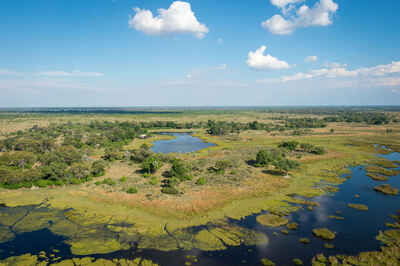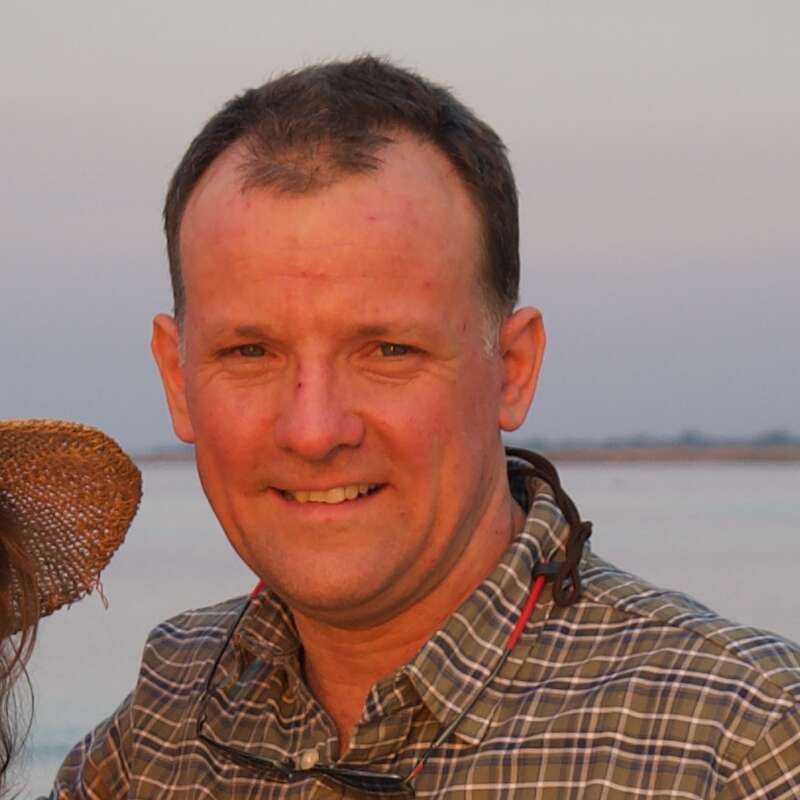About Qorokwe Camp
Opened in November 2017, the luxurious, contemporary Qorokwe Camp stands in a private, wildlife-rich area ...
... in the south-east of the Okavango Delta, bordering Botswana’s Moremi Game Reserve. The camp has great views over a large lagoon that is fed by the Santandadibe River: classic Delta scenery, with high densities of predators.
Qorokwe Camp is modern in design – we think it’s very smart, but it won't suit guests who are looking for a more traditional tented, safari camp. The predator sightings in this area seem to be as good as those a little further to the north, and - although the guiding wasn’t outstanding – we were treated to great game viewing (including on one occasion a cheetah kill right outside camp). With delicious food and friendly staff, we rate it very highly for a luxury, Delta camp experience.
Our view
Qorokwe Camp is modern in design – we think it’s very smart, but it won't suit guests who are looking for a more traditional tented, safari camp. The predator sightings in this area seem to be as good as those a little further to the north, and - although the guiding wasn’t outstanding – we were treated to great game viewing (including on one occasion a cheetah kill right outside camp). With delicious food and friendly staff, we rate it very highly for a luxury, Delta camp experience.
Accommodation
9 suites
Children
Best for 13+
Open
All year
Activities

4WD Safari

Birdwatching

Boat trip

Fishing

Guided walking safari

Helicopter

Mokoro

Night drive

Private activities
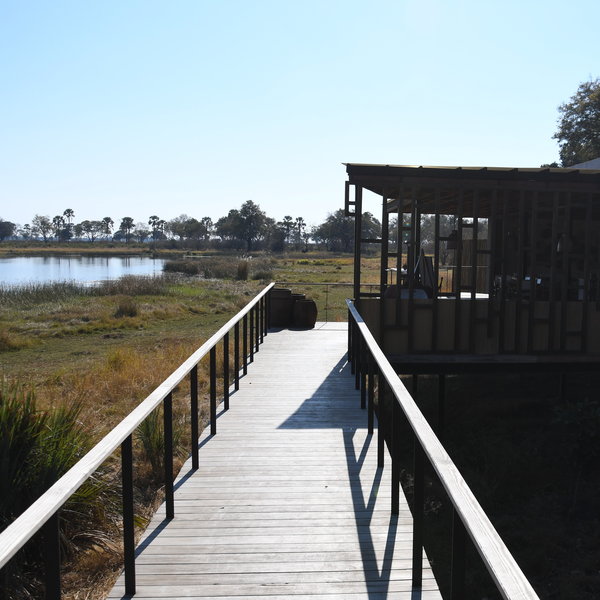
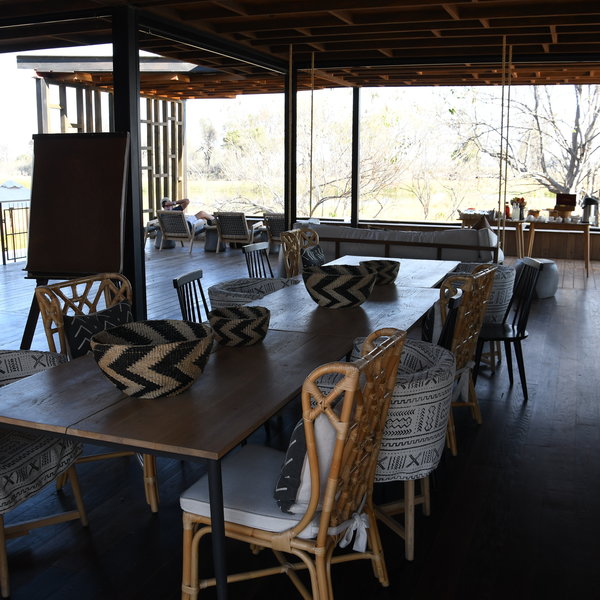
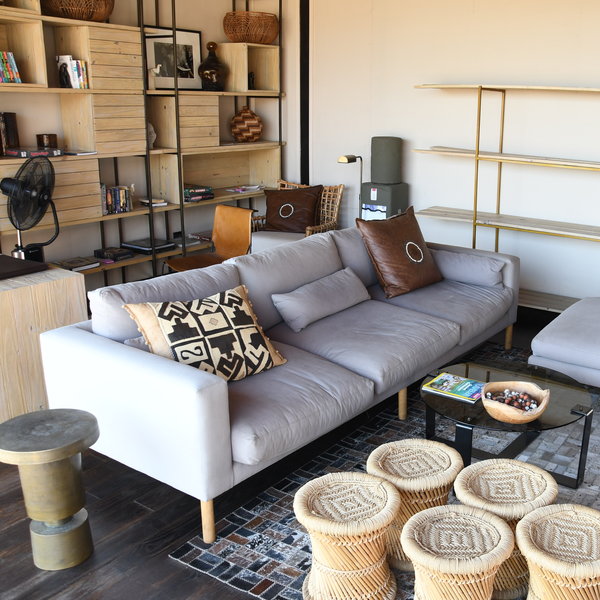
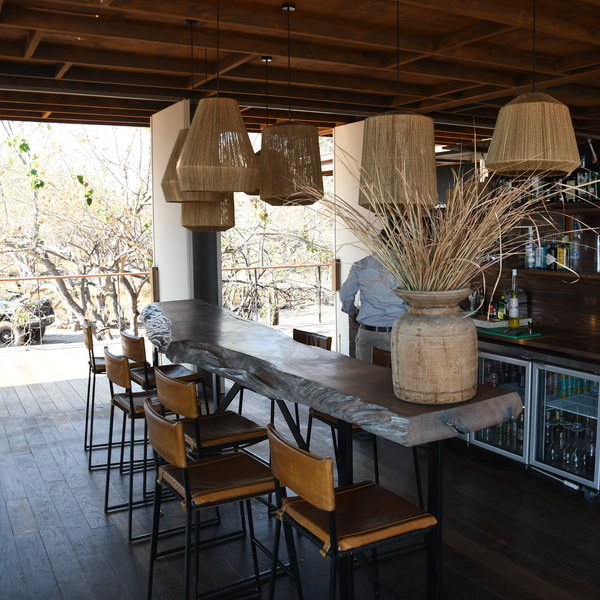
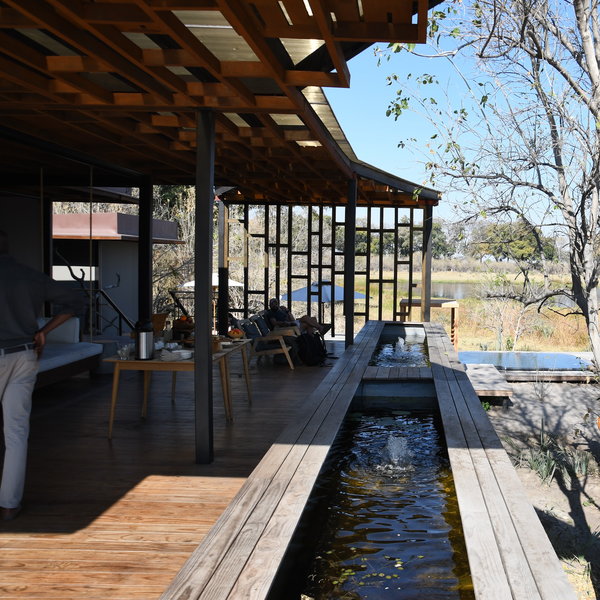
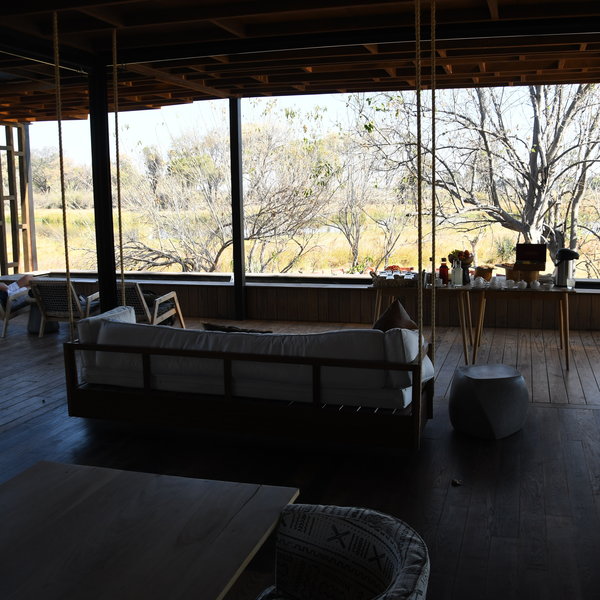
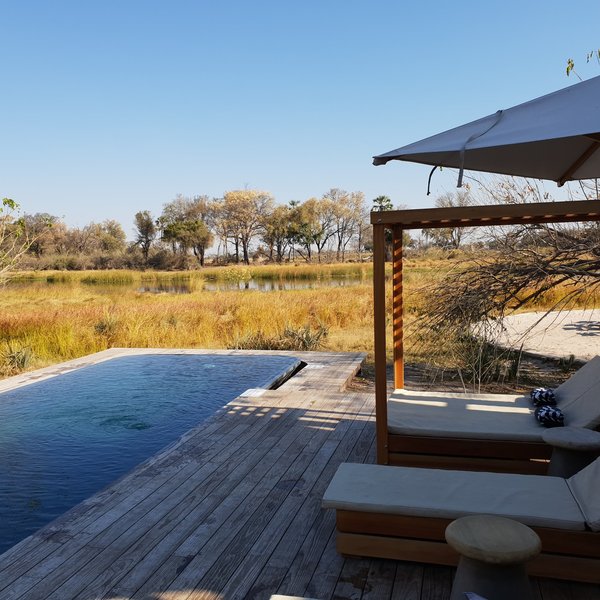
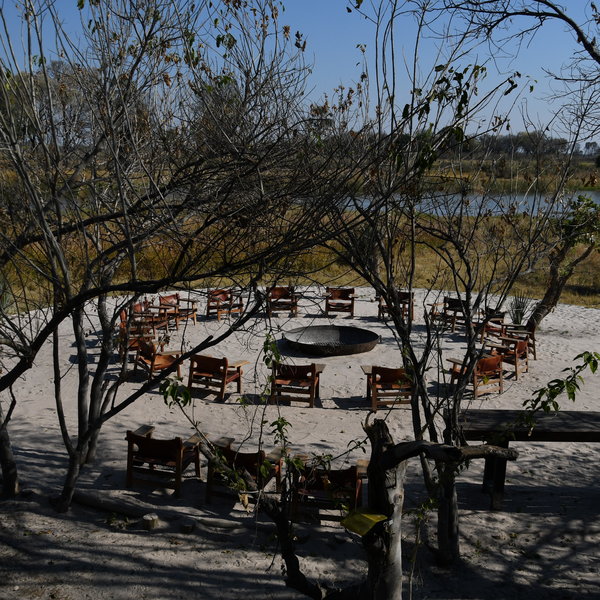
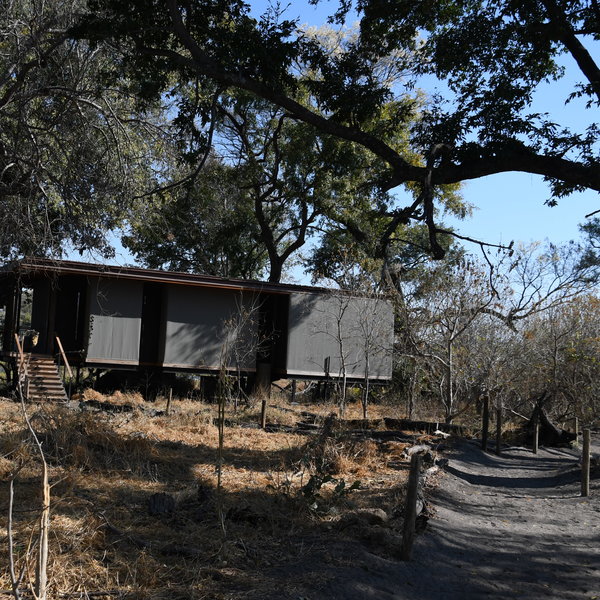
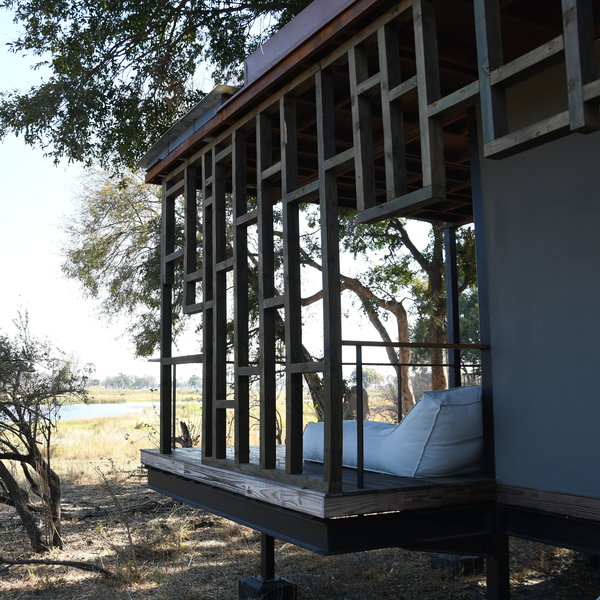
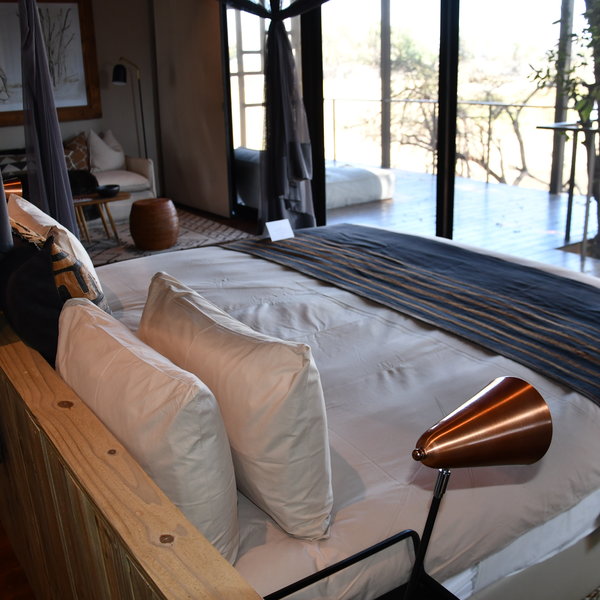
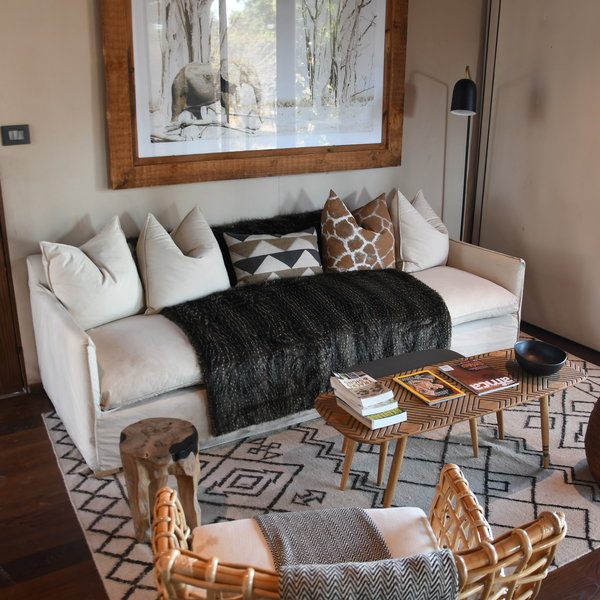
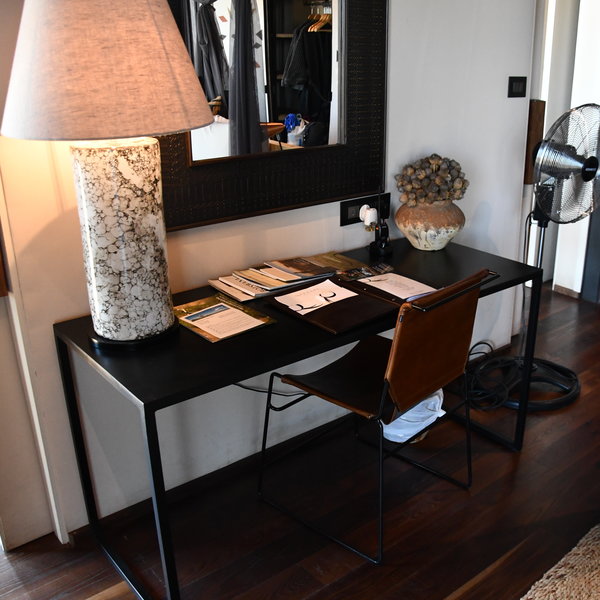
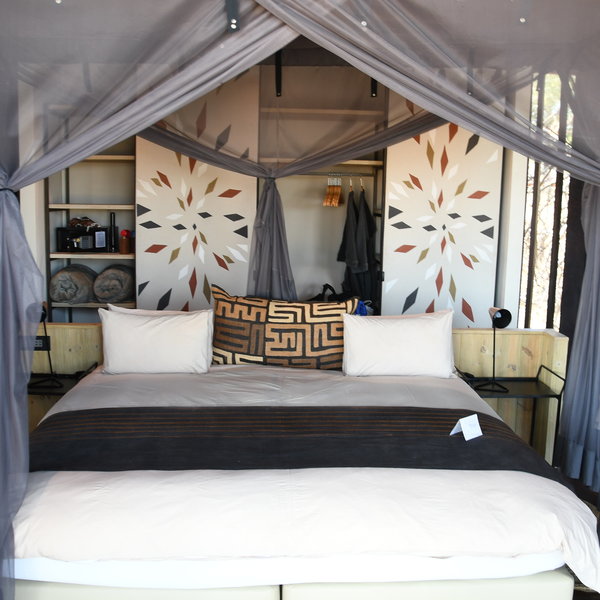
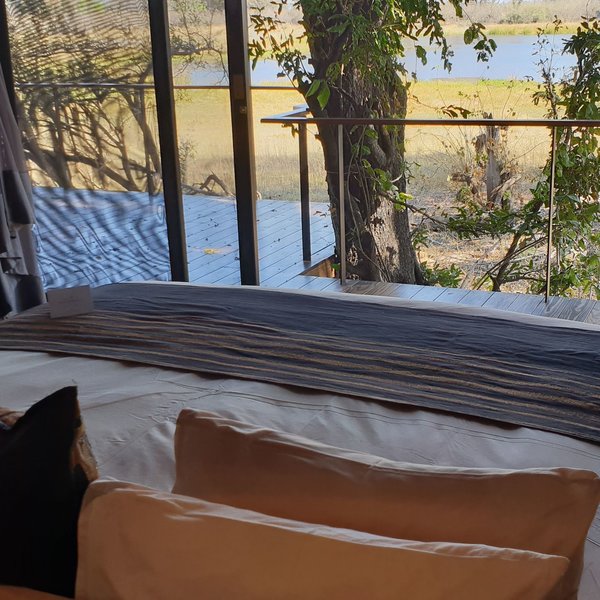
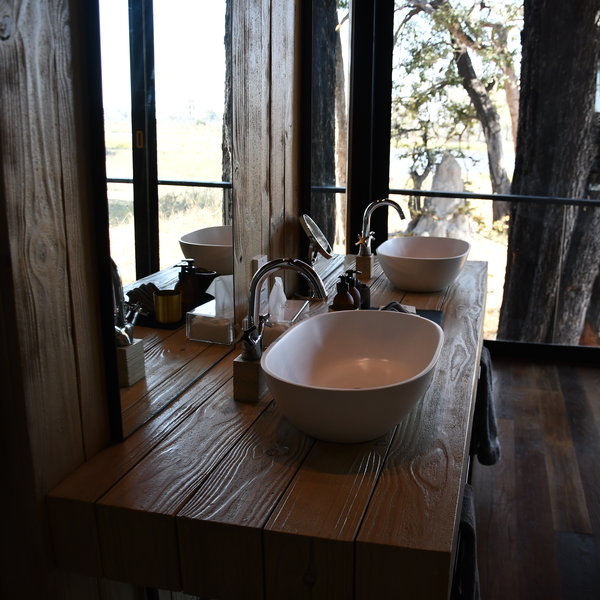
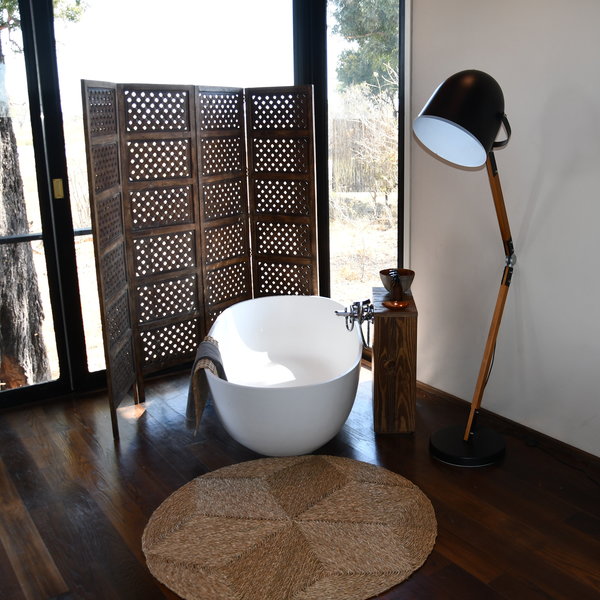
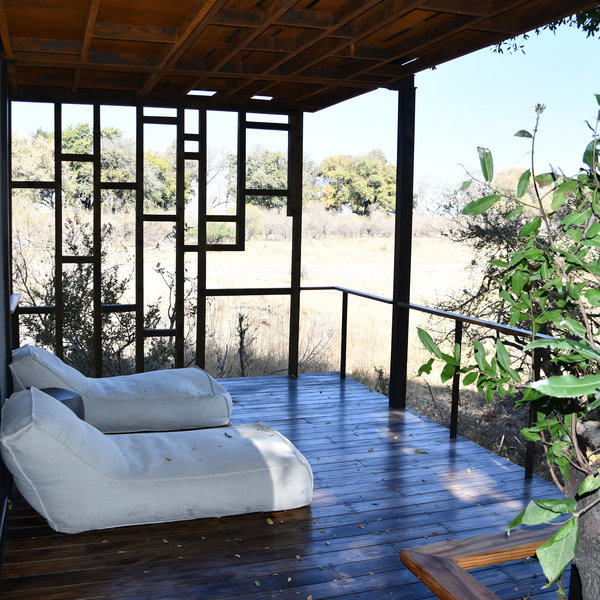
Expert Africa's gallery
When we travel we take lots of photos ourselves to give you a real and un-edited view of the safaris. See our 56 pictures of Qorokwe Camp to get the candid view.
View galleryQorokwe Camp: Our full report
Opened in November 2017, the luxurious, contemporary Qorokwe Camp stands in a private, wildlife-rich area ...
... in the south-east of the Okavango Delta, bordering Botswana’s Moremi Game Reserve. The camp has great views over a large lagoon that is fed by the Santandadibe River: classic Delta scenery, with high densities of predators.
Qorokwe shares this extensive private concession with Gomoti Plains Camp and sister camps Stanley’s Camp and Baines’ Camp. Qorokwe and Gomoti Plains share an airstrip, but once you’ve landed, you head off in opposite directions and it’s very seldom that you’ll see each other’s game vehicles. It’s even less likely that you’ll see a vehicle from Stanley’s and Baines’ as they’re much further south and the distance is vast, with rivers and seasonal floodplains between them.
Qorokwe is certainly a luxurious camp, far more contemporary in design than most others in the Delta and very different from the more “traditional tented” safari design. This is evident as soon as you approach the substantial main area: a boxy, mostly open-plan structure of geometric wrought iron and wood. The open sides overlook the lagoon and the woodland beyond, as well as the inviting swimming pool and firepit. During our stay we saw a number of buffalo and elephants in front of camp enjoying water in the permanent lagoon; for a closer look, take advantage of one of the telescopes on the deck that are trained on this area.
Rugs and woven mats add texture and colour to the dark-wood flooring, woven baskets hang from the walls and terracotta pots crowd the corners, combining traditional objects with the modern design. Kick off your shoes and delve into a natural-history book from the comfort of cream sofas or rattan stools, or move to the beautiful central bar crafted from a single plank of wood – or perhaps simply take in the classic Delta landscape from the swing bench.
The infinity pool, down a few steps from the main area, is big enough to do a length or two before chilling on a sunlounger on the deck. There is a large circular firepit here too, jutting out slightly into the reeds at the edge of the lagoon. This makes a lovely spot for drinks before or after dinner accompanied by the chirruping of frogs and against the backdrop of the lodge’s nightlit incarnation.
Sandy pathways covered in bark chips weave through the bush to Qorokwe’s nine suites, which feature the same box design as the main area. Each suite is raised on a platform a few feet off the ground to offer views over the lagoon and bush, with a large wooden deck leading inside to a very spacious open-plan room. All are similarly modern in design, including an even more sizy family suite (which has its own plunge pool), and feature wood-and-steel frames stretched with canvas, floor-to-ceiling mesh windows, and large sliding doors.
The room itself has a lounge area with a sofa and a couple of chairs, with the bed in the centre, draped with a walk-in mosquito net. Storage areas at the back include wardrobes with sliding doors and a table with a small kettle and coffee plunger. There’s a ceiling fan above the bed, a standing fan next to the desk (which has international plug points and a USB port), and a third standing mist fan in the lounge. Bathrobes, slippers and a hairdryer come as standard. Qorokwe’s 100% solar power seems to allow all these appliances to run efficiently. There’s even WiFi, with a pretty good and reliable connection – although bear in mind that this is the bush!
In the bathroom you’ll find a free-standing bath, his and hers basins, a toilet in a separate room and a large shower with a glass door that you can slide open to create an outdoor shower concept. Each room also comes with a yoga mat and set of dumbbells. Sliding doors in front of the bed access the deck that runs almost the length of the room, set with a couple of large comfortable day beds so you can sit back and take in the surroundings.
The landscape around Qorokwe is diverse, typical of this region of the Okavango Delta, a mix of dry mopane woodland and palm-dotted islands amongst floodplains bisected by seasonal waterways. We’ve always regarded Qorokwe’s sister camps, Chitabe Camp and Chitabe Lediba, as one of the best areas for predator sightings in the Delta, and the area around its southern neighbour, Qorokwe, appears to be equally good. Certainly, we have had some fantastic wildlife viewing here during several brief stays, on a recent stay in April 2019, including a pride of eight lions that watched intently from under a bush as a number of young giraffes wandered past. On one occasion, we raced back after hearing news of a cheetah stalking near the lodge and watched as the female recovered from hunting an impala while her two cubs were feeding on the kill.
Although the guiding on our various visits was good, we have generally felt that it didn’t quite match the high-quality feel of the lodge. In particular, although our guides knew the area well, they didn’t offer a huge amount of information. Staff, however, were consistently friendly, professional and efficient.
While the activities at Qorokwe focus on exploring on a game-drive vehicle, guided walks - with an armed guide, and mokoro excursions and boat trips on the nearby Santantadibe River may also be possible - depending on water levels.
Back at the lodge, Qorokwe doesn’t have a spa, but their in-house beauty therapist can offer a number of treatments in the comfort of your room, or on your private deck.
Activities
4WD Safari
Birdwatching
Boat trip
Fishing
Guided walking safari
Helicopter
Mokoro
Night drive
Private activities
Families & children
- Attitude towards children
- Children over the age of six years are welcome at Qorokwe Camp.
- Property’s age restrictions
- For families travelling with children between the ages of 6 and 12 years, private activities must be booked and these will be at an extra cost. Children younger than six may be accepted by special arrangement, and then only if the entire camp is reserved for exclusive use. Note that the minimum age for walking or mokoro activities is 13 years, and participation is at the discretion of the camp manager and guide.
- Special activities & services
- There are no special activities or services for children, but Qorokwe does have a family suite with its own private plunge pool, and the main area has a much bigger swimming pool.
- Equipment
- No special equipment is available.
- Generally recommended for children
- We think that the adult nature and feel of this camp would suit mature children over the age of 12.
- Notes
- Qorokwe Camp is unfenced and as such dangerous wildlife can move through camp. In addition, the buildings are raised on stilts and the pool is unfenced. Children must therefore be kept under close parental supervision at all times.
Food & drink
- Usual board basis
- Full Board & Activities
- Food quality
- We’ve found the food at Qorokwe Camp really good during various stays, and it lived up to our high expectations during our most recent trip in December 2019.
Meals are a mixture of either plated or buffet, depending on the number of guests in camp and where you want to eat. They’re incredibly flexible, whether you want to eat in your own room, around the pool or in the comfort of the dining room. With sufficient notice, Qorokwe can cater to vegetarians and other special dietary requirements.
A light breakfast , served before we headed out on our morning activity, offered the choice of yoghurt, cereal, fruit, muffins, pastries, tea and coffee. If you want to sleep in a little later and skip the sit-down breakfast, you can op for “breakfast-on-the-go”. Then, a packed breakfast usually consisting of separate jars of muesli and yoghurt, fruit, nuts, hard-boiled eggs, and either muffins or pastries, will be sent in your game vehicle for you to eat “on the go”. You can even take along a “take-away” cappuccino in the vehicle for your drive.
At around 12.00, after the morning activity, there’s normally a more substantial buffet lunch. A large chalkboard displays the daily menu, which for us was beef stirfry, green salad, vegetable quiche and broccoli salad, followed by a platter of fruit and cheese.
For dinner we enjoyed a parsnip and white bean soup, and then had the choice of coq au Riesling or venison fillet with a red-wine jus. Both were accompanied by herb-roasted baby potatoes, spinach and feta lasagne, broccoli and sesame seeds, roast vegetables and goats cheese and a garden salad. Dessert was a poached pear or an almond tart. - Dining style
- Mixture of group dining and individual tables
- Dining locations
- Indoor and Outdoor Dining
- Further dining info, including room service
- You can’t call the kitchen to place your order, but with advance notice, you can request to have lunch and/or dinner served in your suite.
- Drinks included
- Bottled water, soft drinks, local beers and spirits and a limited selection of (usually) South African red and white wines are included. Champagne and imported wines and spirits will cost extra and may need to be requested in advance.
The tap water is filtered and is safe for washing, showering and cleaning your teeth, but to drink, it is recommended that guests stick to the water specially provided in both the suites and the main area.
Our travellers’ wildlife sightings from Qorokwe Camp
Since mid-2018, many of our travellers who stayed at Qorokwe Camp have kindly recorded their wildlife sightings and shared them with us. The results are below. Click an animal to see more, and here to see more on our methodology.

100% success

100% success

100% success

100% success

100% success

100% success

100% success

100% success

100% success

0% success

0% success

0% success

0% success

0% success

0% success

0% success
Getting there
- Location
- Okavango Delta Safari Reserves, Botswana
- Ideal length of stay
- We’d recommend a stay of three nights at Qorokwe Camp.
- Directions
- It is roughly 15 minutes by light aircraft from Maun to Qorokwe airstrip, or 45 minutes from Kasane, depending on where the plane stops on the way, followed by a 45-minute game drive to camp.
- Accessible by
- Fly-and-Transfer
Special interests
- Wildlife safaris
- Situated in a reliably good concession on the south-eastern side of the Okavango Delta, Qorokwe is in one of Botswana’s great wildlife-viewing destinations, particularly in the dry season between July and October when the grasses are lower.
- See ideas for Wildlife safaris in Botswana
Communications
- Power supply notes
- There is a back-up generator for emergencies.
- Communications
- There is no cellphone reception, but Wi-Fi is available in the suites.
- TV & radio
- There is no TV or radio.
- Water supply
- Borehole
- Water supply notes
- All the suites have plumbed hot and cold running water, and flushing toilets.
Health & safety
- Malarial protection recommended
- Yes
- Medical care
- Camp managers are trained in first aid. Medical evacuation by air is available in case of emergency, but please note that it is only possible to fly out of camp during daylight hours as the bush airstrips do not have any lighting at night. The nearest doctor is in Maun and there are hospitals in Maun and Johannesburg.
- Dangerous animals
- High Risk
- Security measures
- Guests are escorted to their suites after dark as dangerous wildlife is known to wander through the camp. Radios and “fog horns” are provided in the suites to call for assistance in case of emergency.
- Fire safety
- Each suite has a fire extinguisher.
Useful info
- Disabled access
- On Request
- Laundry facilities
- A full laundry service is included.
- Money
- No exchange facilities are offered at Qorokwe Camp. There is a small safe in each suite that can fit travel documents, cash and wallets.
- Accepted payment on location
- Mastercard and Visa credit cards are accepted, but Diners and Amex are not. Cash in the form of South African rand, GB sterling, US dollars, euros and Botswana pula is accepted.
Plan and book your trip with Expert Africa
All of our trips are tailor-made, so we'll always adapt them to suit you. Talk to an Expert and let us plan and arrange your perfect trip.

Talk to an Expert
Call or email us now! We’ll match you with the Specialist in our team who is best suited to help you. Then together we can start planning your trip.

Set up your itinerary
Based on our experience and your ideas, your specialist will create a detailed, costed itinerary. We’ll refine it together, until we have a trip that you’re perfectly happy with.

Prepare for your trip
The same Specialist will make the seamless arrangements for your trip, send you detailed travel documents, and be available to answer any questions before you depart.

Travel with peace of mind
After you set off, you’ll be cared for by our partners in Africa, most of whom have worked with Expert Africa for decades. And if you ever need us urgently, we’re available 24/7.

When you return
We love to learn about your trip, and so will always be grateful if you’ve the time to give feedback to your Specialist when you return.
Qorokwe Camp's location
Look closer at the environment and surroundings of Qorokwe Camp.
Excursions from Qorokwe Camp
Optional extra day-trips and excursions possible whilst you're staying at Qorokwe Camp. Talk to us: these are usually best arranged before you go.
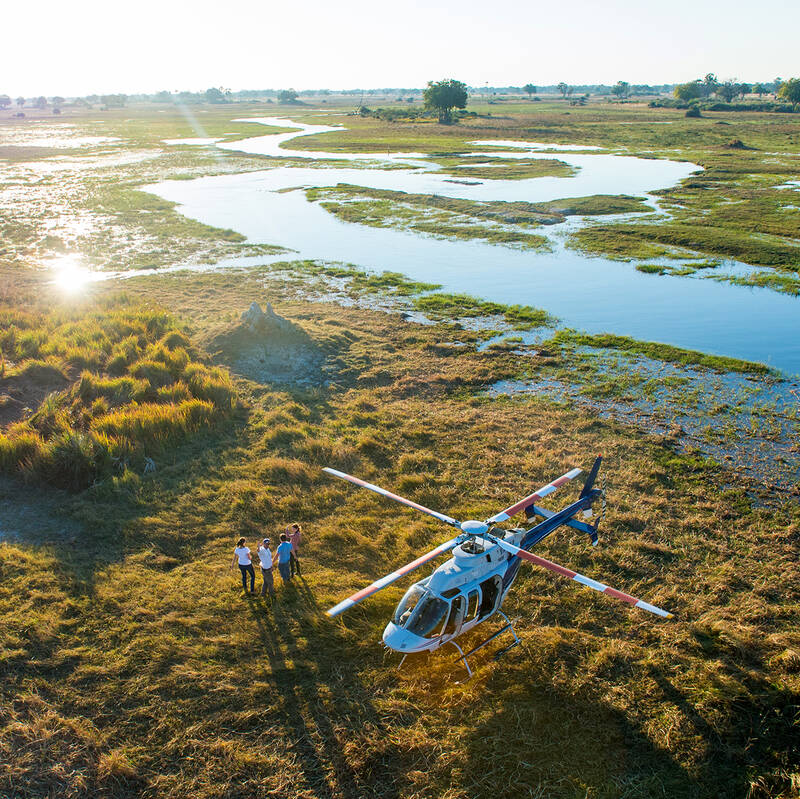
Helicopter Flight - Botswana
Various: from 30 minutes to half a day.
Low-flying, agile and offering superb views, helicopters are an ideal way to move around the Okavango Delta.You can use them instead of fixed-wing inter-lodge transfers or as an addition to other wildlife watching activities, and of course, helicopters can hover to allow that perfect pic, whereas fixed-wings can’t.
More about Helicopter FlightOther lodges in Okavango Delta Safari Reserves
Alternative places to stay in this same area.
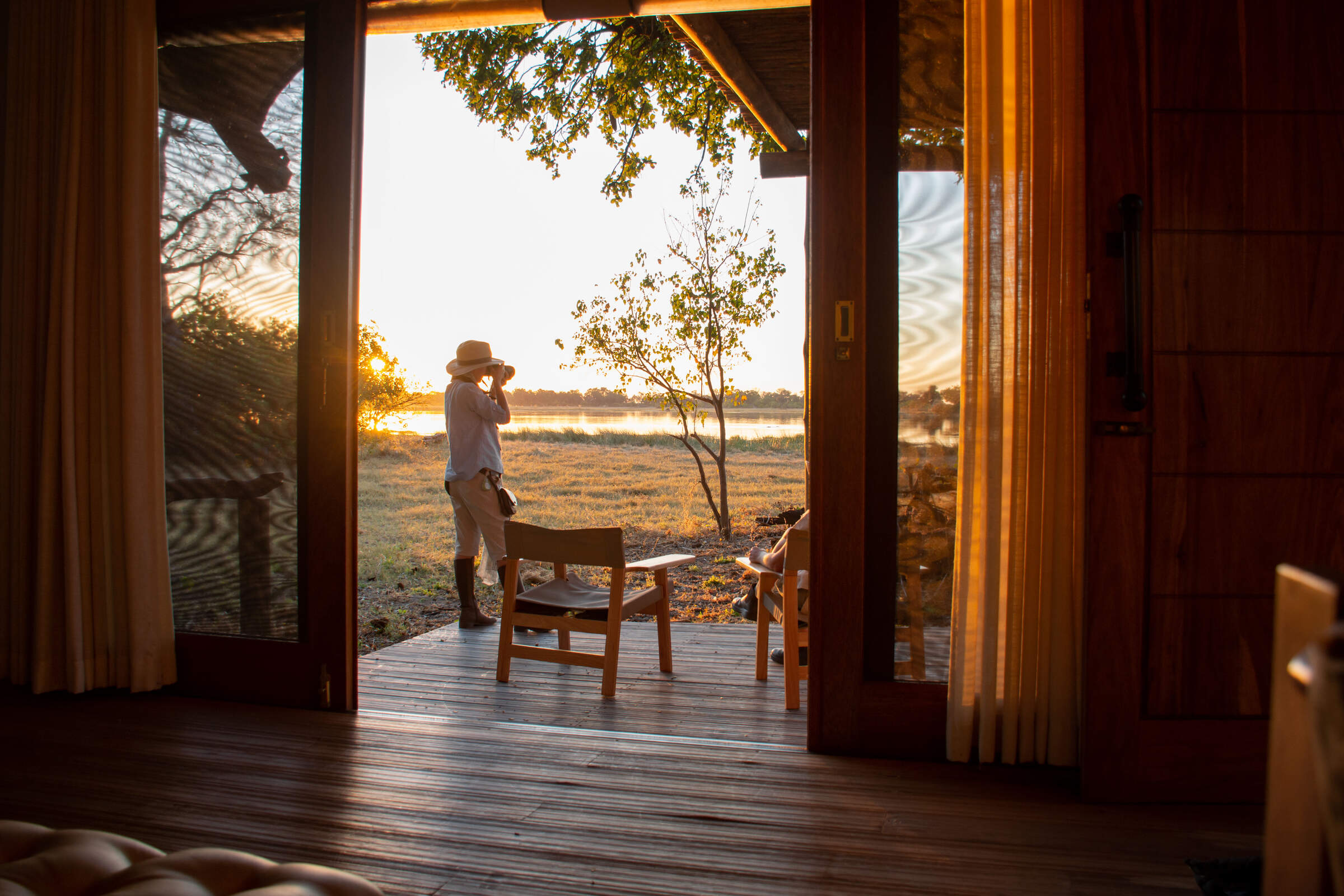
Kwara Camp
Kwara Camp's private reserve boasts land and water activities year-round, with excellent game-viewing opportunities and access to permanent channels of the north-east Okavango Delta.
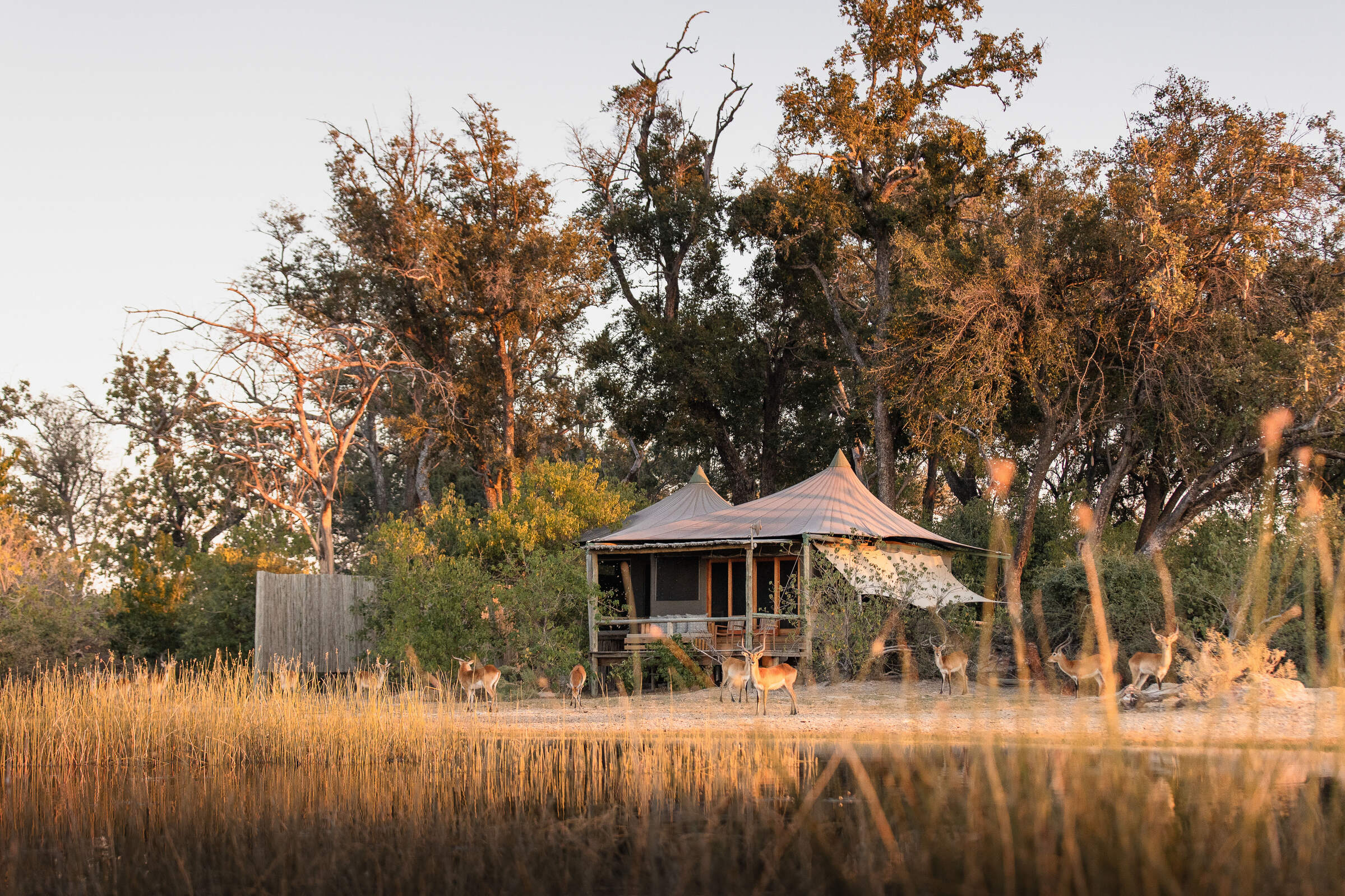
Little Vumbura
On a secluded island within a private reserve, Little Vumbura combines superb game viewing with a broad diversity of habitats in a truly picturesque setting.
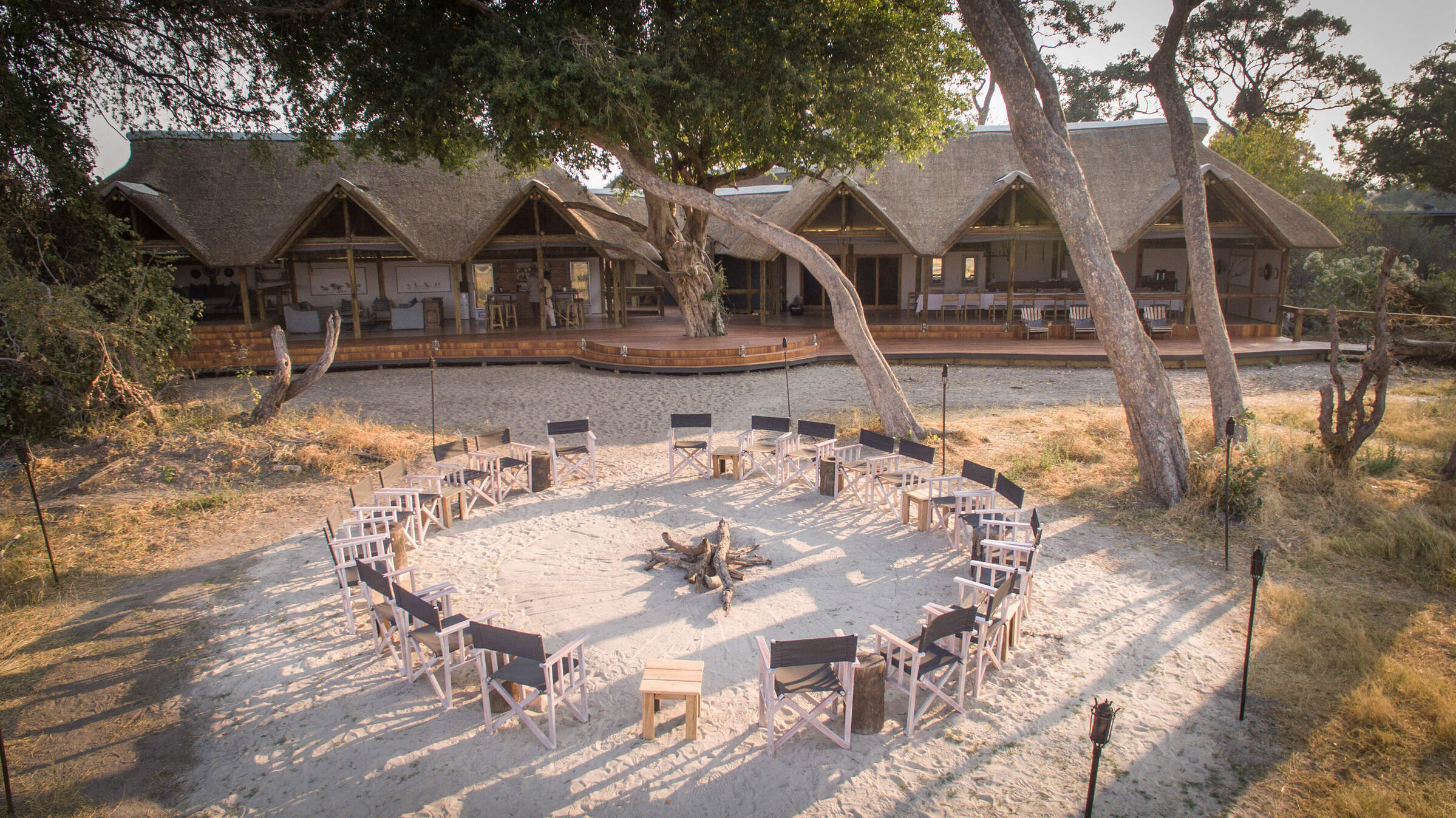
Splash Camp
Set in the Kwara Reserve, offering superb wildlife viewing year-round, Splash offers both land and water activities led by guides with a particular knack for tracking big game.
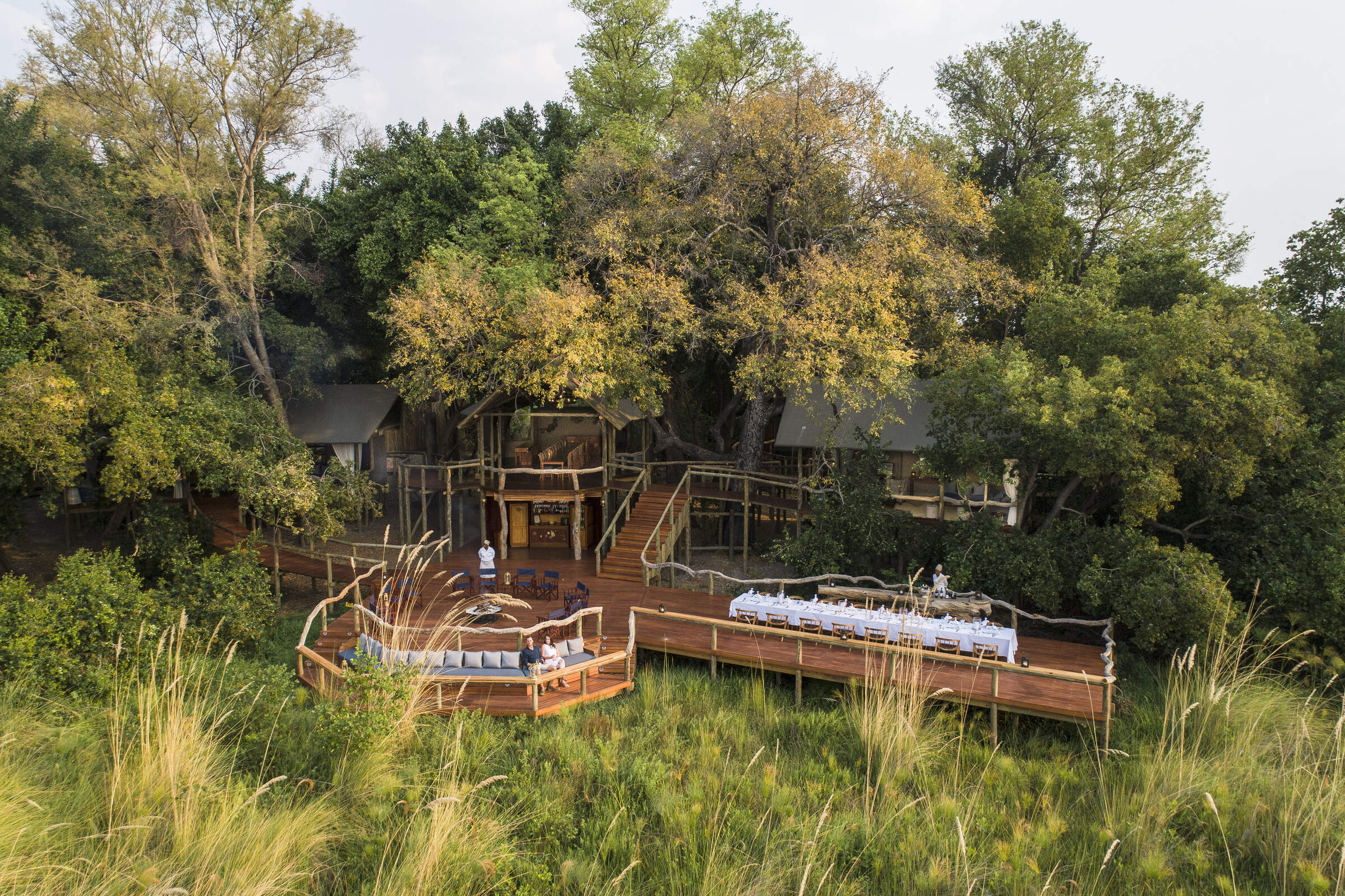
Shinde Camp
With experienced staff and a wealth of activities, Shinde offers a traditional safari in an exceptionally varied and wildlife-rich environment.
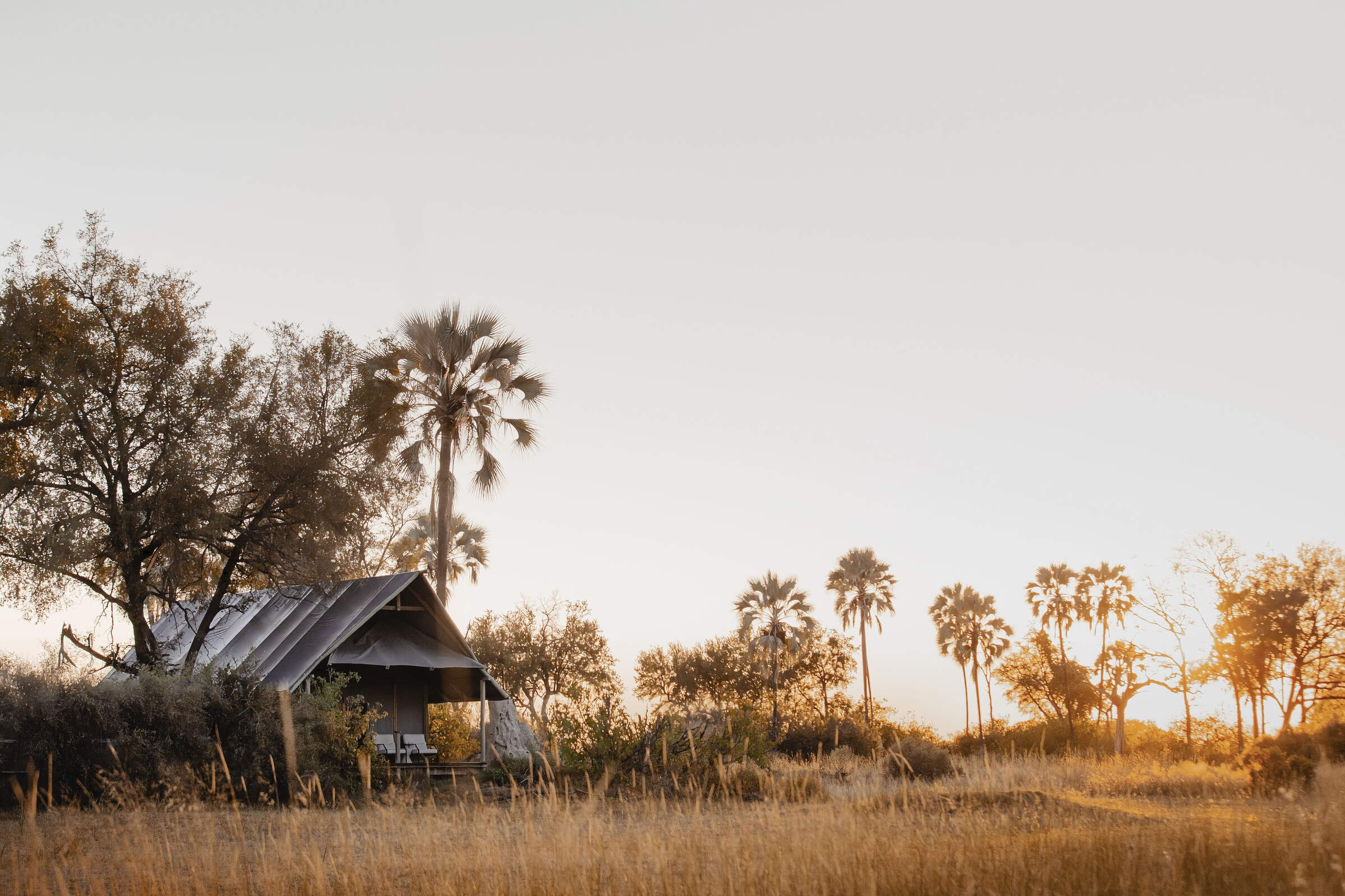
Chitabe Lediba
Chitabe Lediba, in Botswana's southern Okavango Delta, is a small family friendly safari camp; it offers great dry-land safaris and in our experience consistently delivers good game sightings.
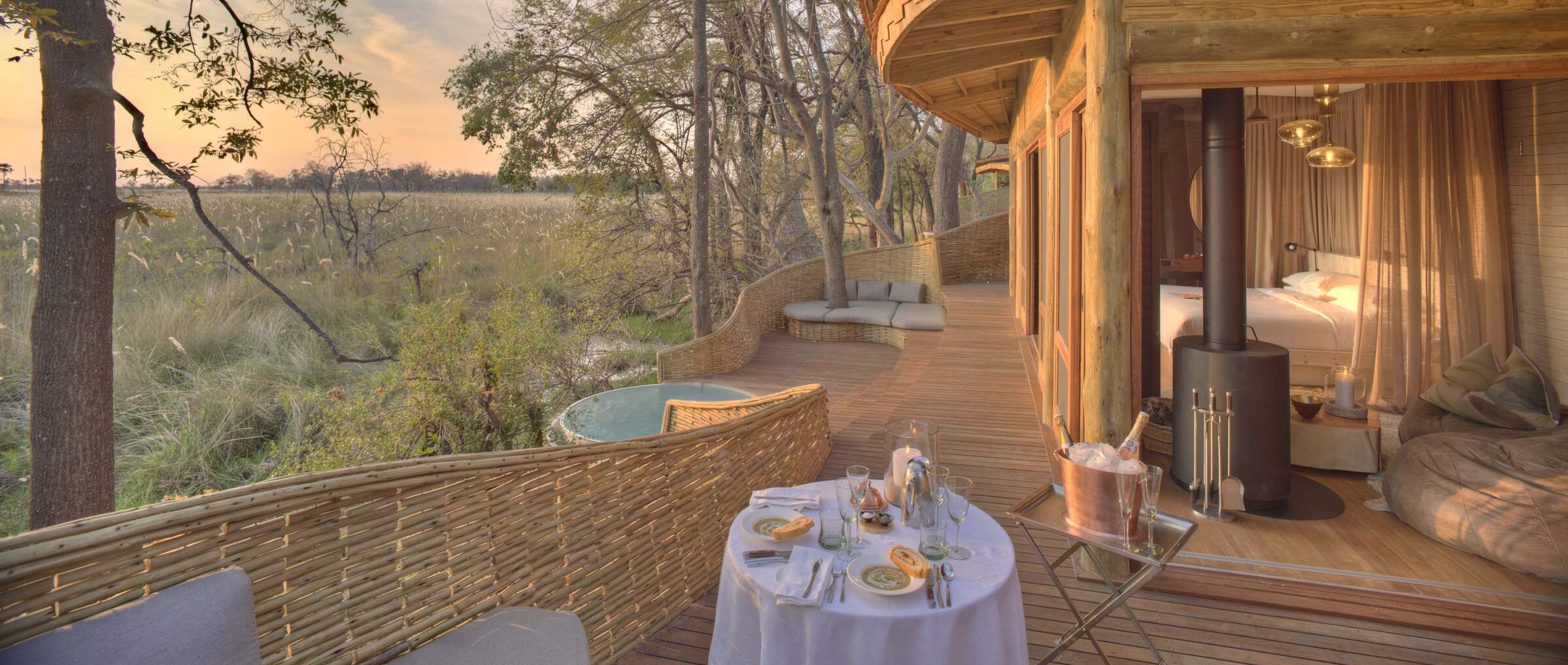
Sandibe Safari Lodge
The luxurious Sandibe Okavango Safari Lodge lies in a private concession in the heart of the Okavango Delta, beside Moremi Game Reserve, with superb big-game viewing.
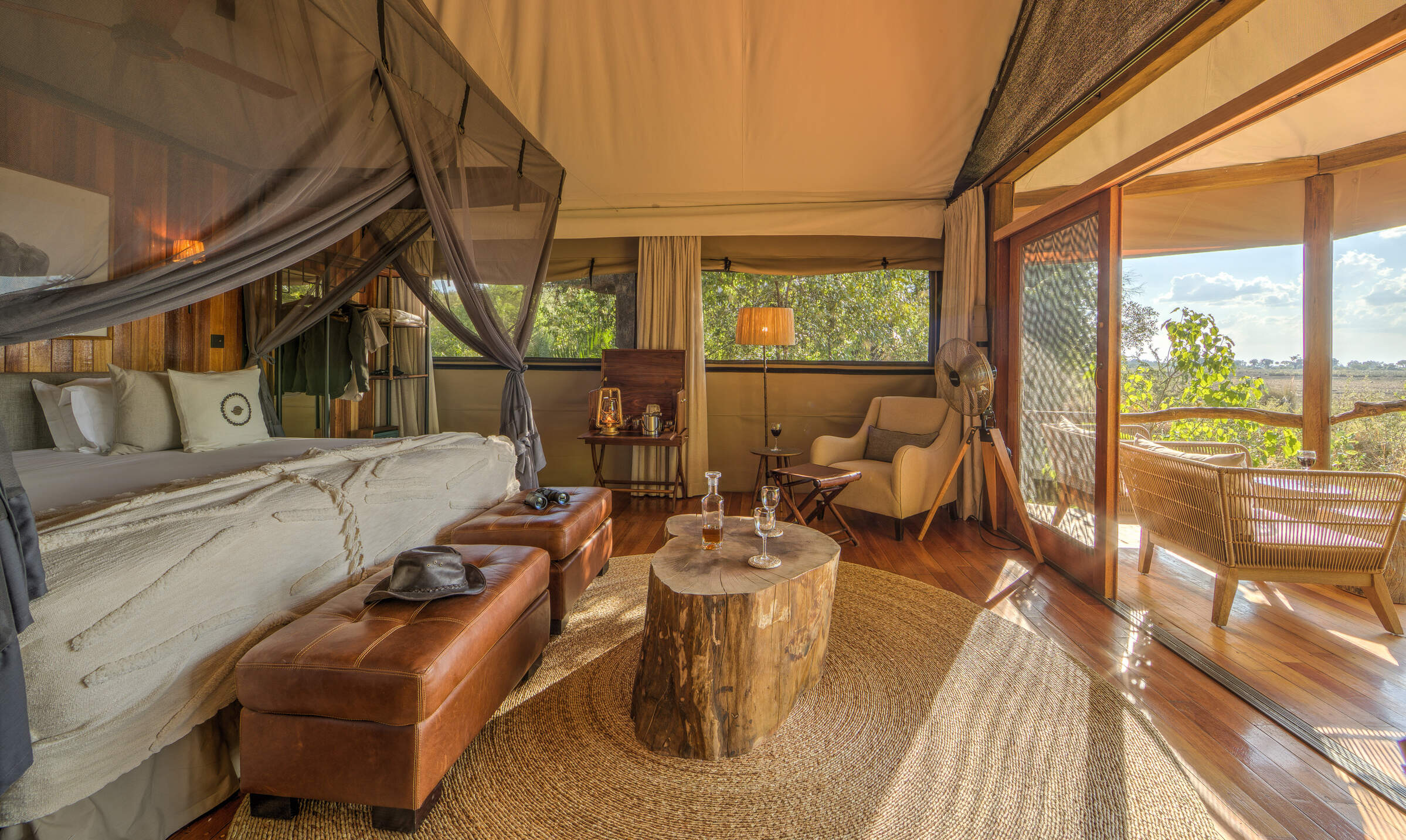
Kanana
In a beautiful part of the Delta, Kanana focuses on fantastic water activities and birding – including exclusive access to an impressive heronry.
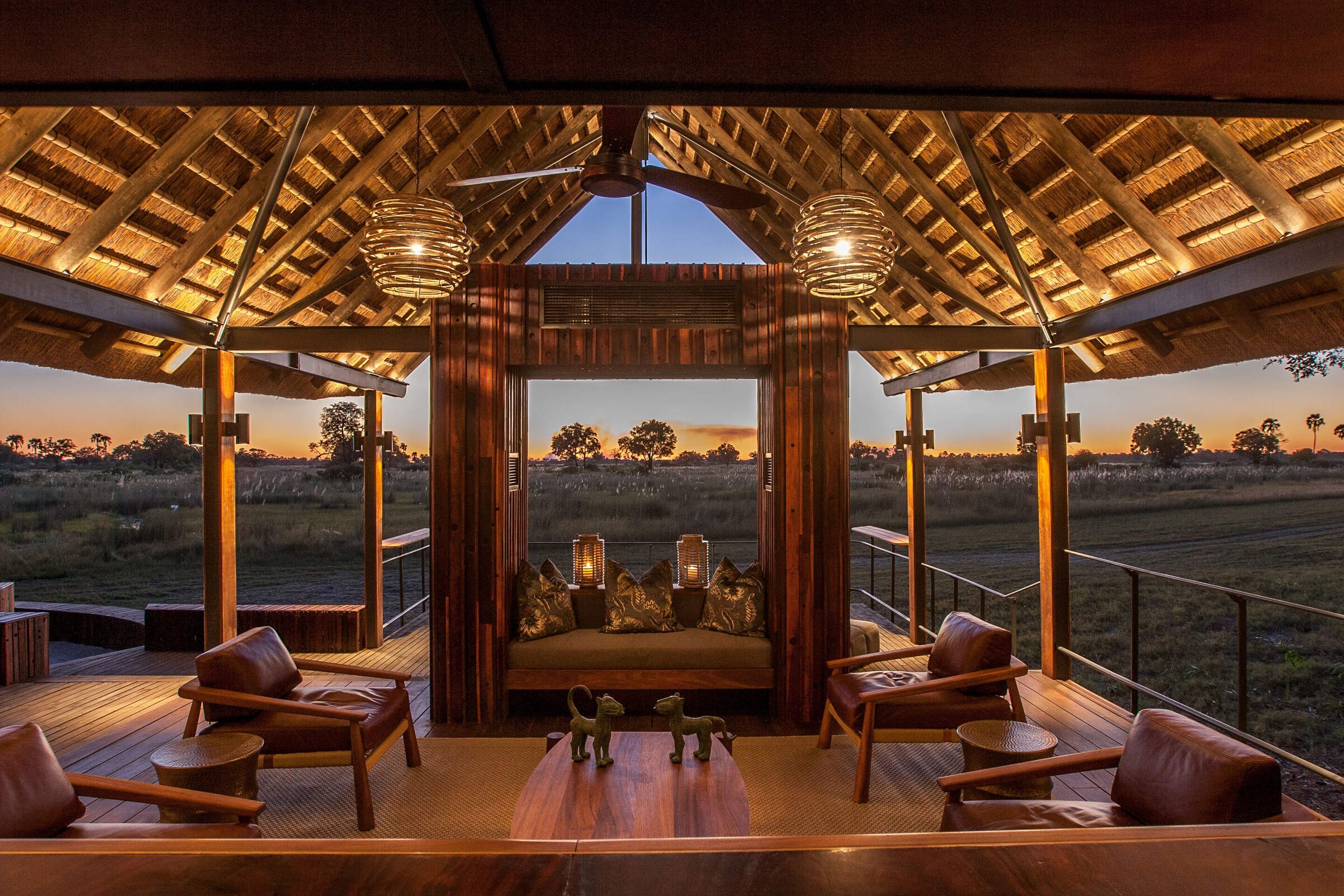
Chitabe Camp
In the southern Okavango Delta, the excellent Chitabe Camp concentrates on dry-land safaris in an area that we've found particularly good for wild dog sightings.
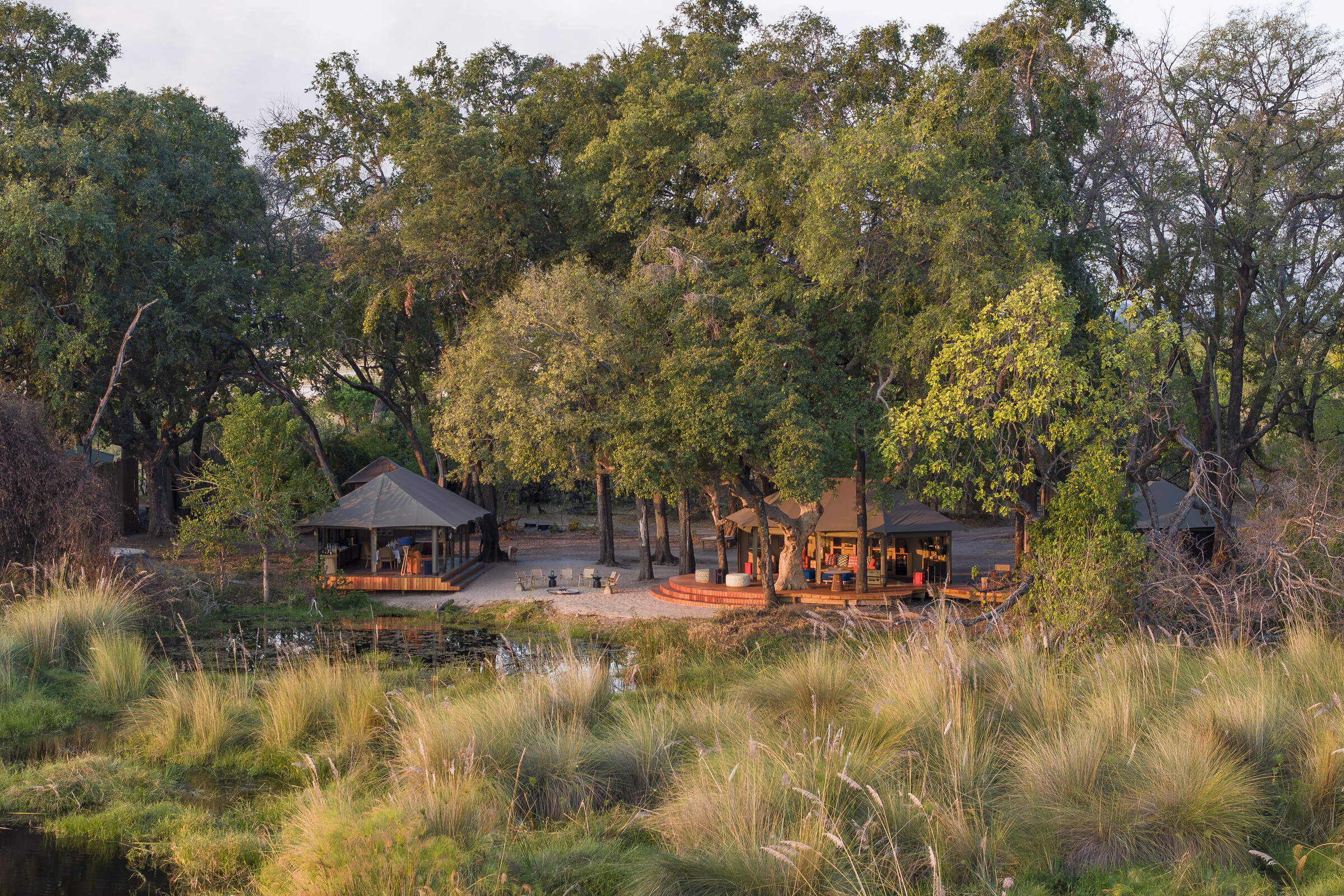
Shinde Footsteps
Small and simple, but comfortable, Shinde Footsteps focuses on walking safaris as well as game drives; it also runs a special children's programme so is particularly suitable for families.
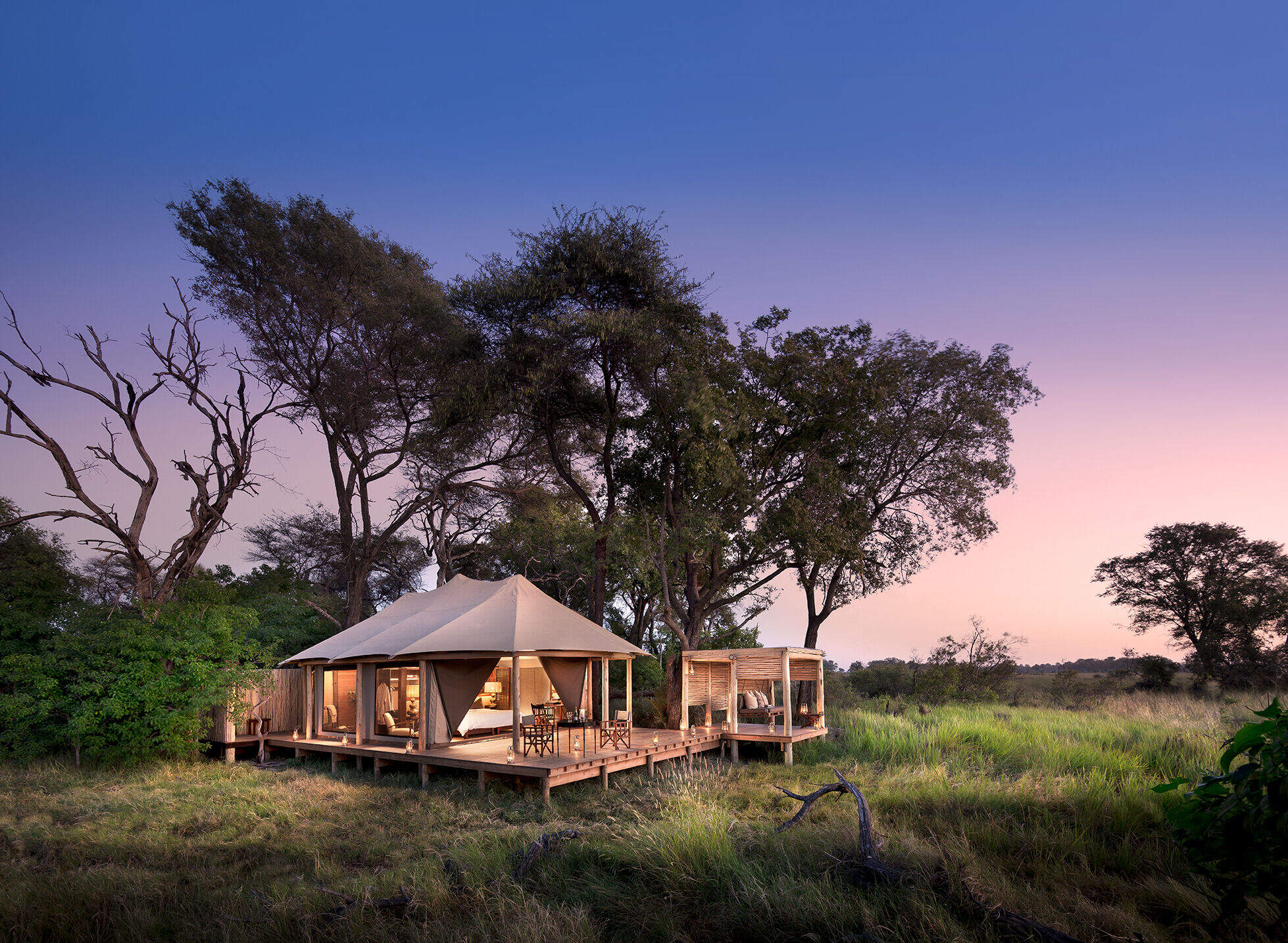
Nxabega Tented Camp
Nxabega offers a selection of both land- and water-based activities, plus very good guiding, food and service, but game viewing can be somewhat erratic.
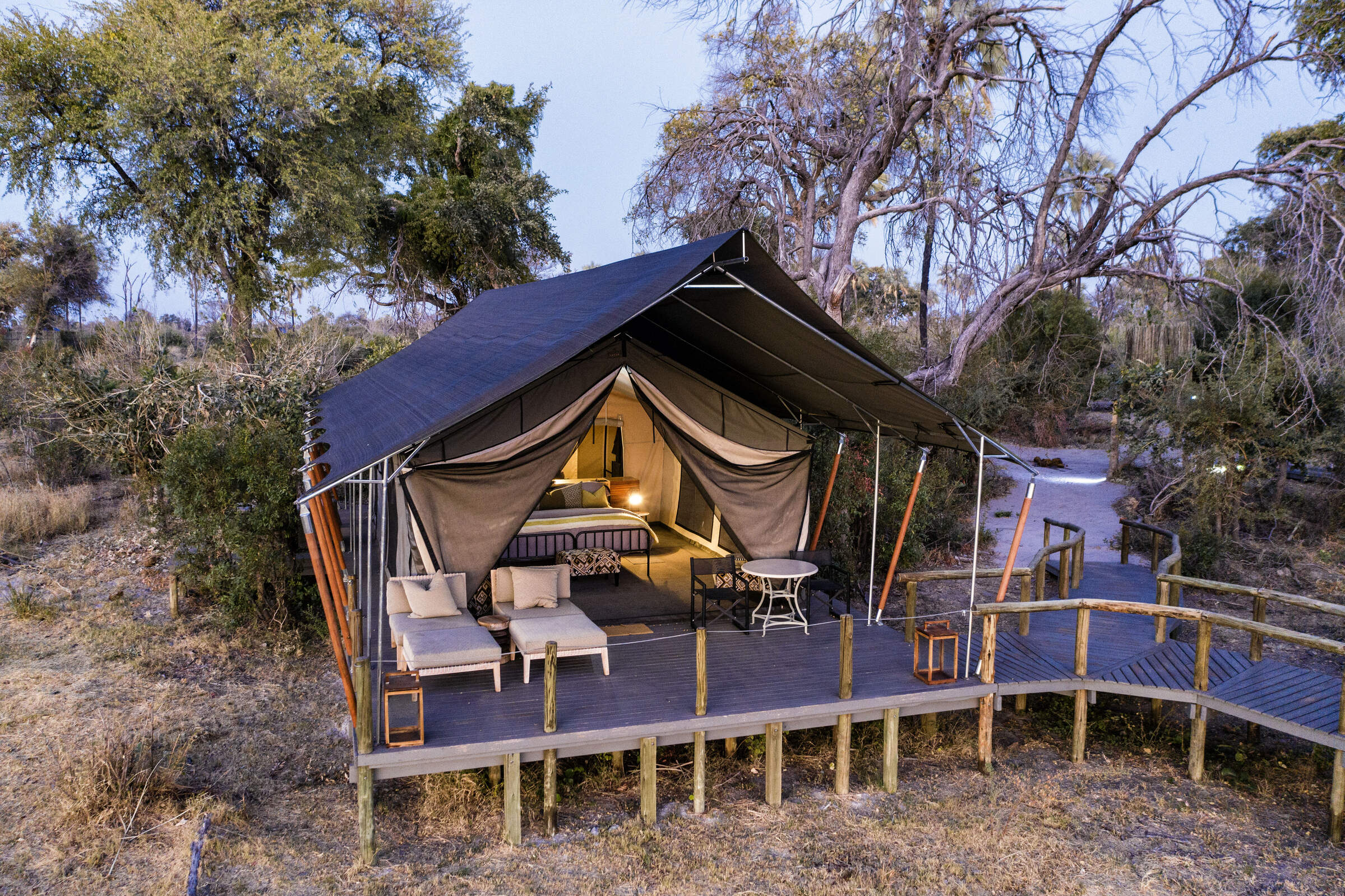
Gomoti Plains
Overlooking a tributary of the Gomoti River, Gomoti Plains Camp is a classically designed camp with very comfortable tents in a good game-viewing area.
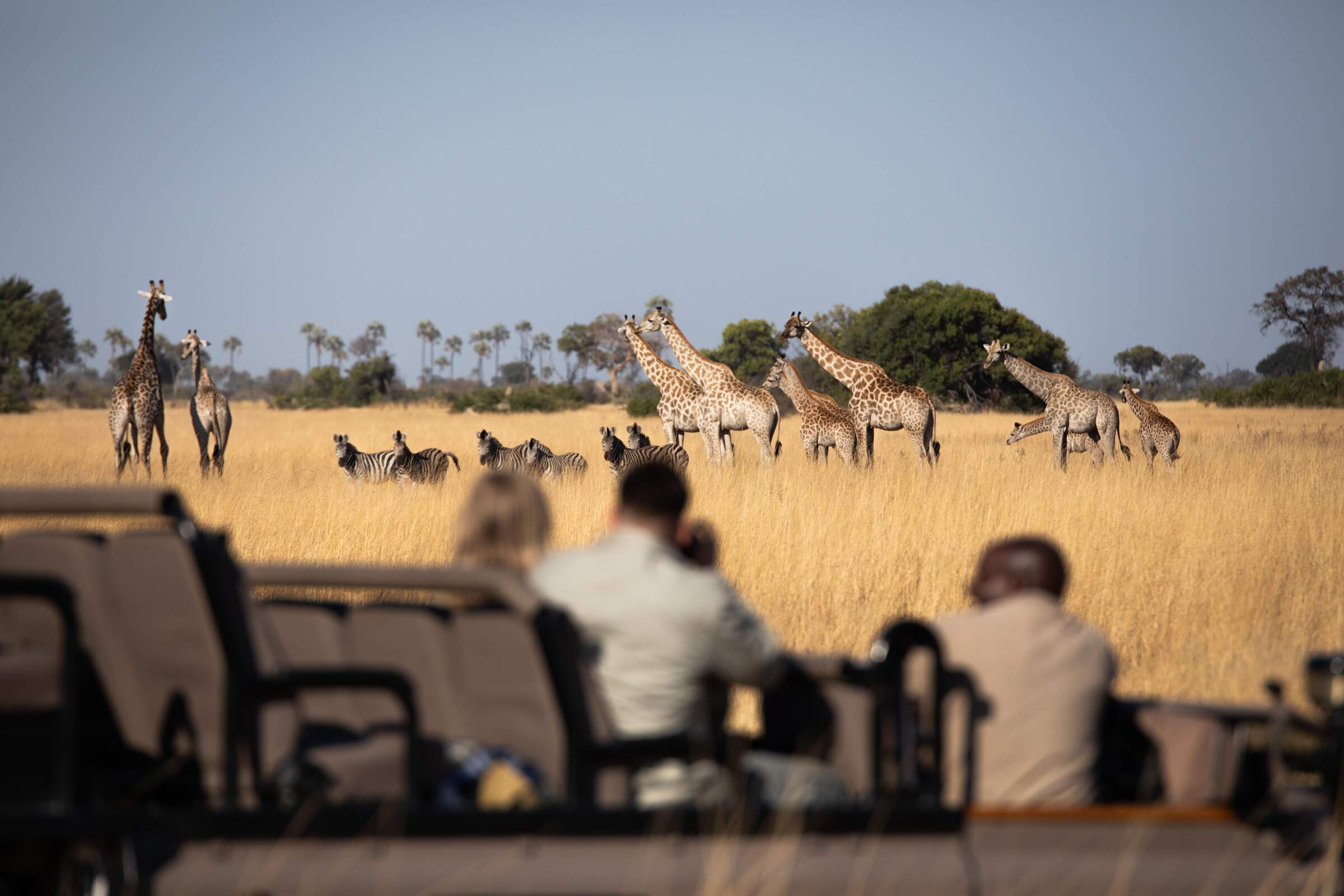
Tubu Tree Camp
A traditional tented camp with a distinctive tree-house feel, Tubu Tree offers some of the best game viewing in the Jao Reserve.
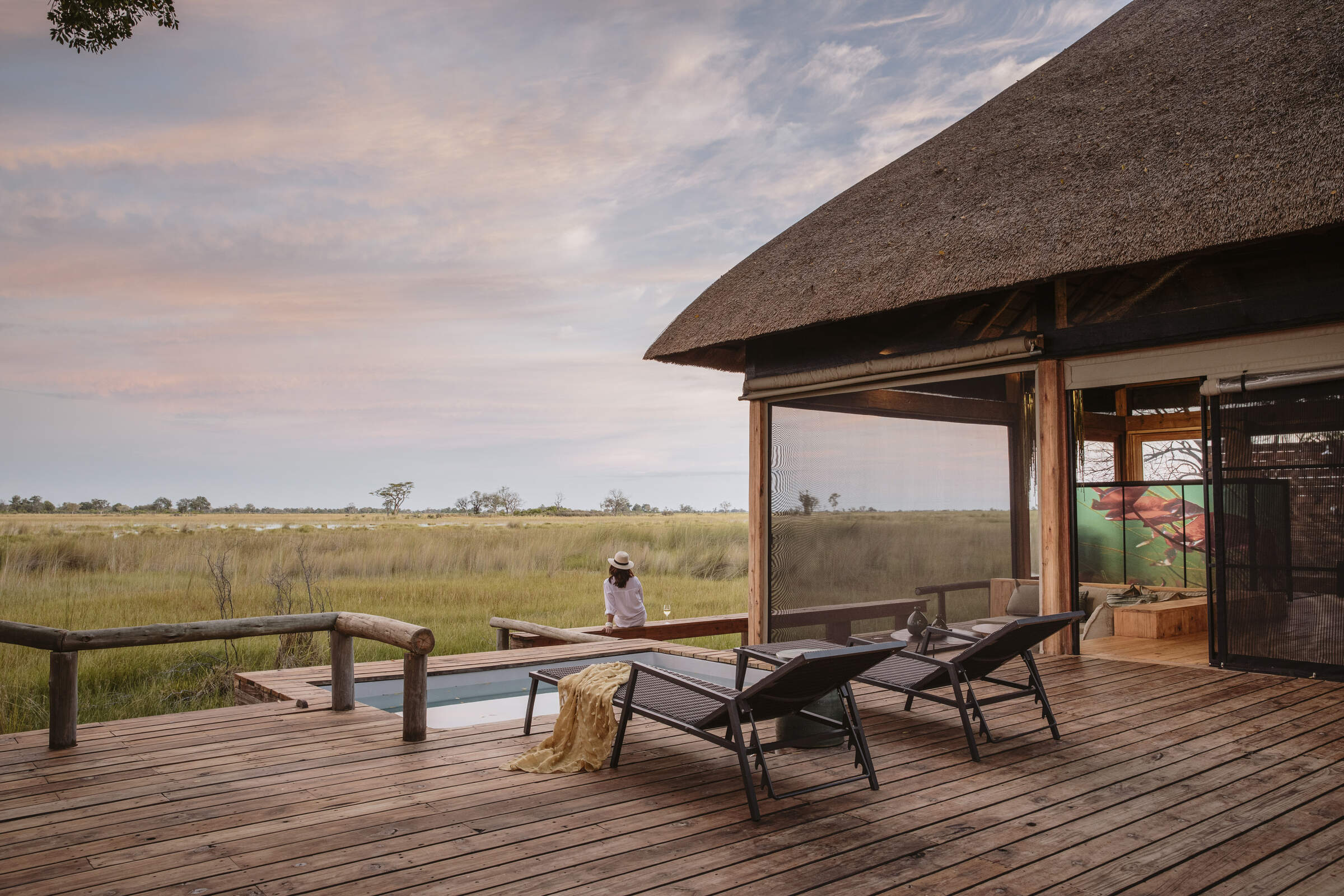
Vumbura Plains
Indulgently stylish and luxurious, Vumbura Plains offers superb game viewing and birding on an exceptionally varied private reserve.
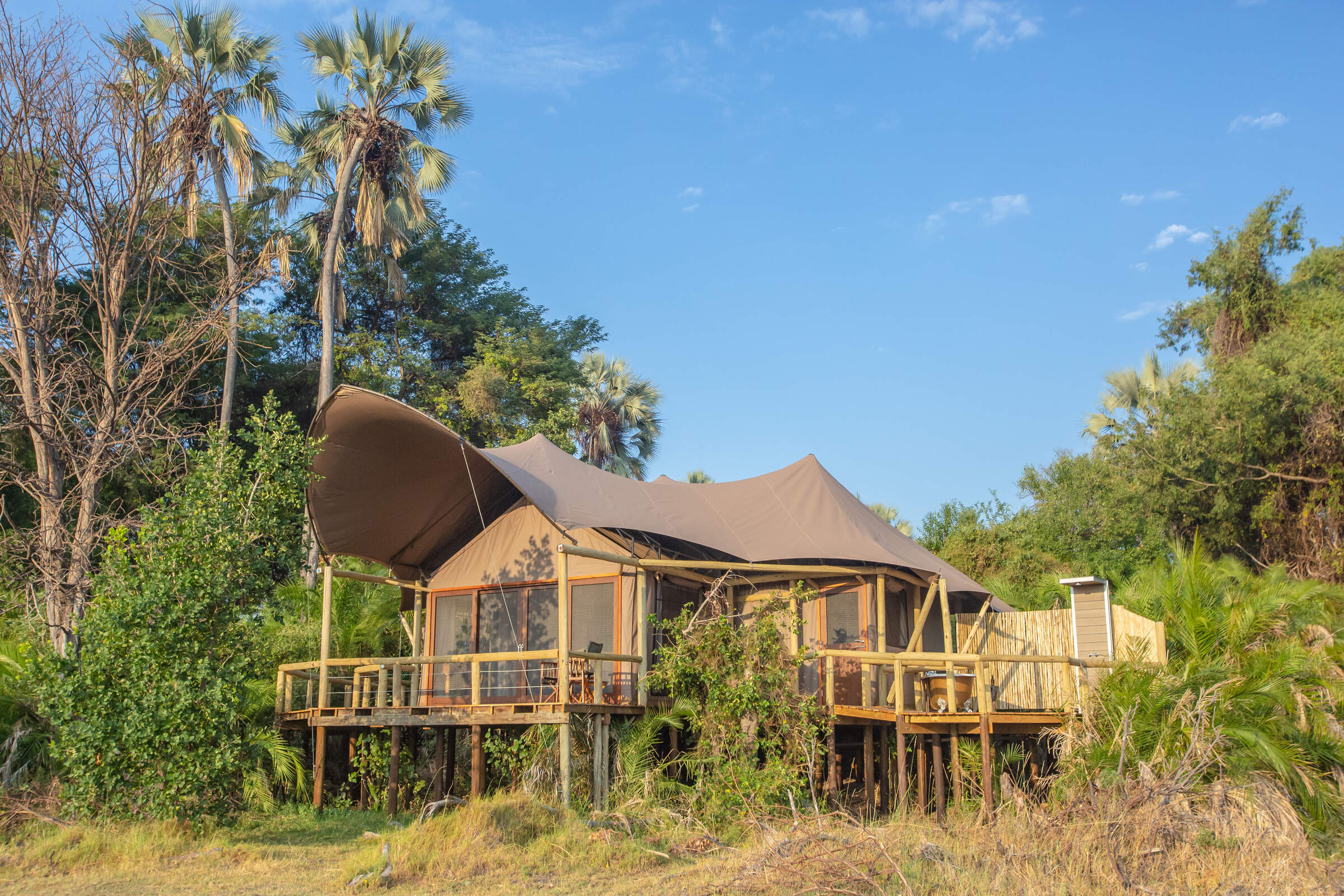
Jacana Camp
Jacana Camp is a small safari camp with an informal island feel; it is ideal for water-based activities in the Delta and offers excellent birdwatching.
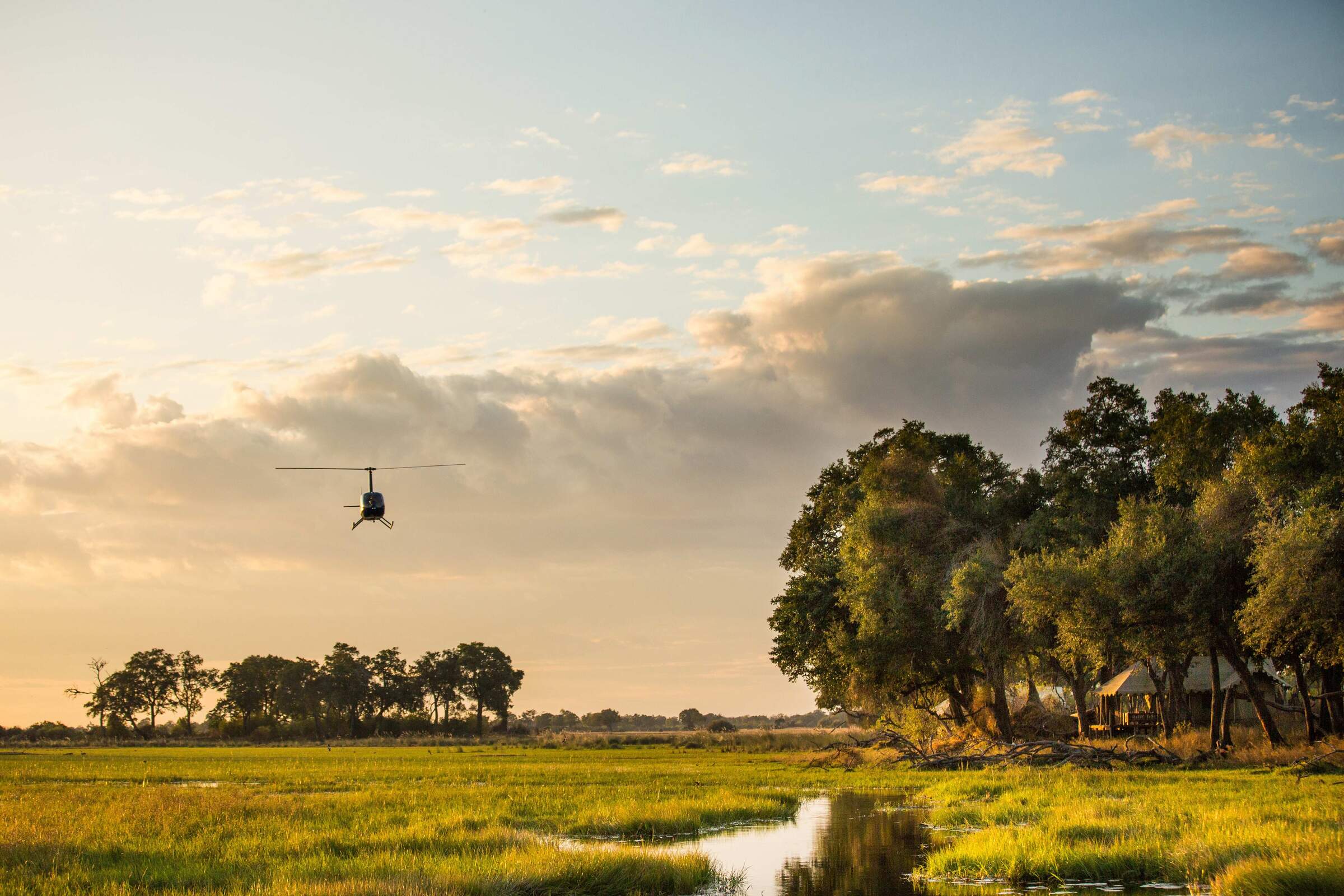
Duba Explorers Camp
Intimate and elegant, Duba Explorers Camp promises a firm safari focus in a remote corner of the Okavango, led by a team who value the highest guiding and hosting standards.
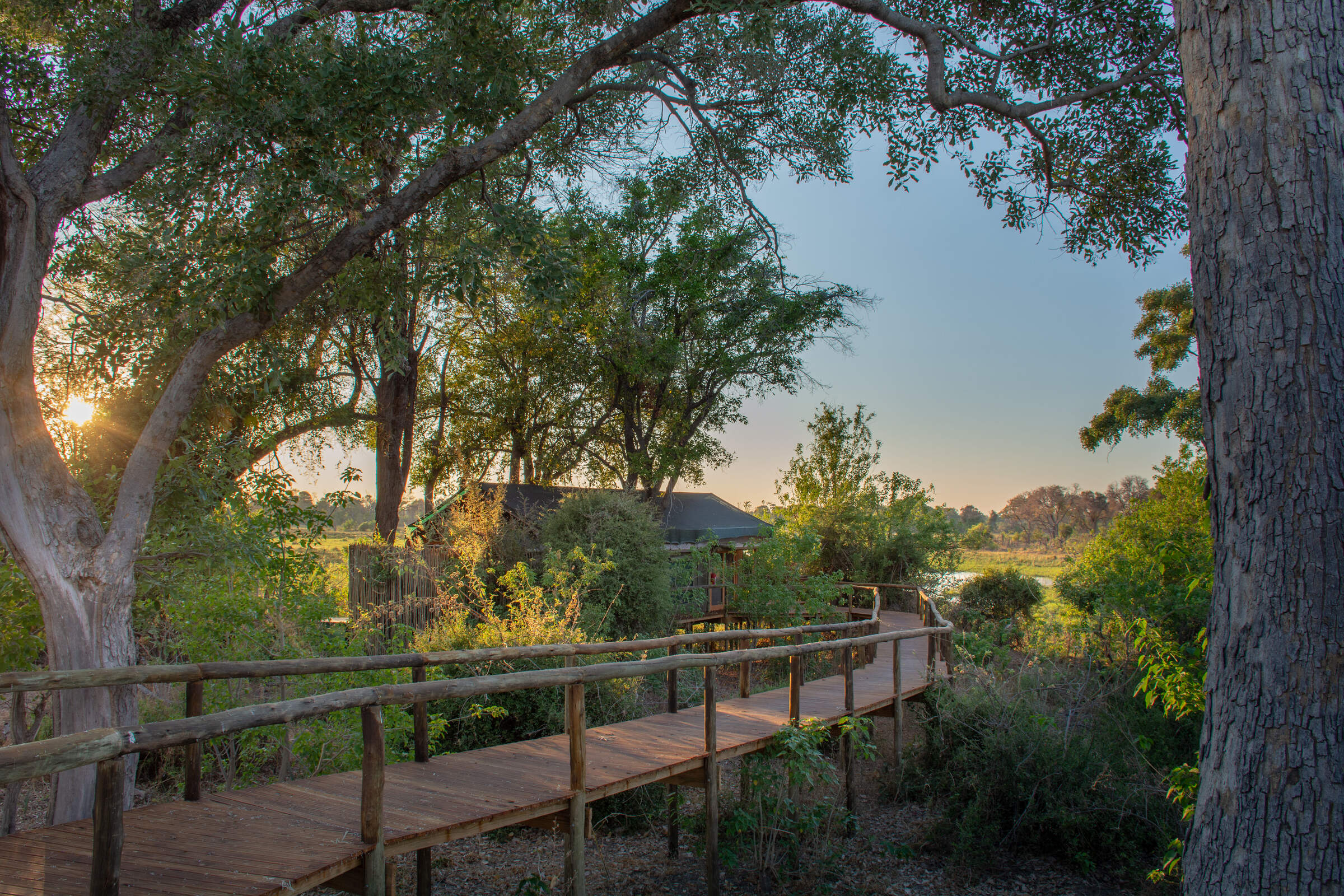
Mma Dinare
Beautifully located in a private concession overlooking the Gomoti River, the traditional Mma Dinare is very well-priced for the Okavango Delta.
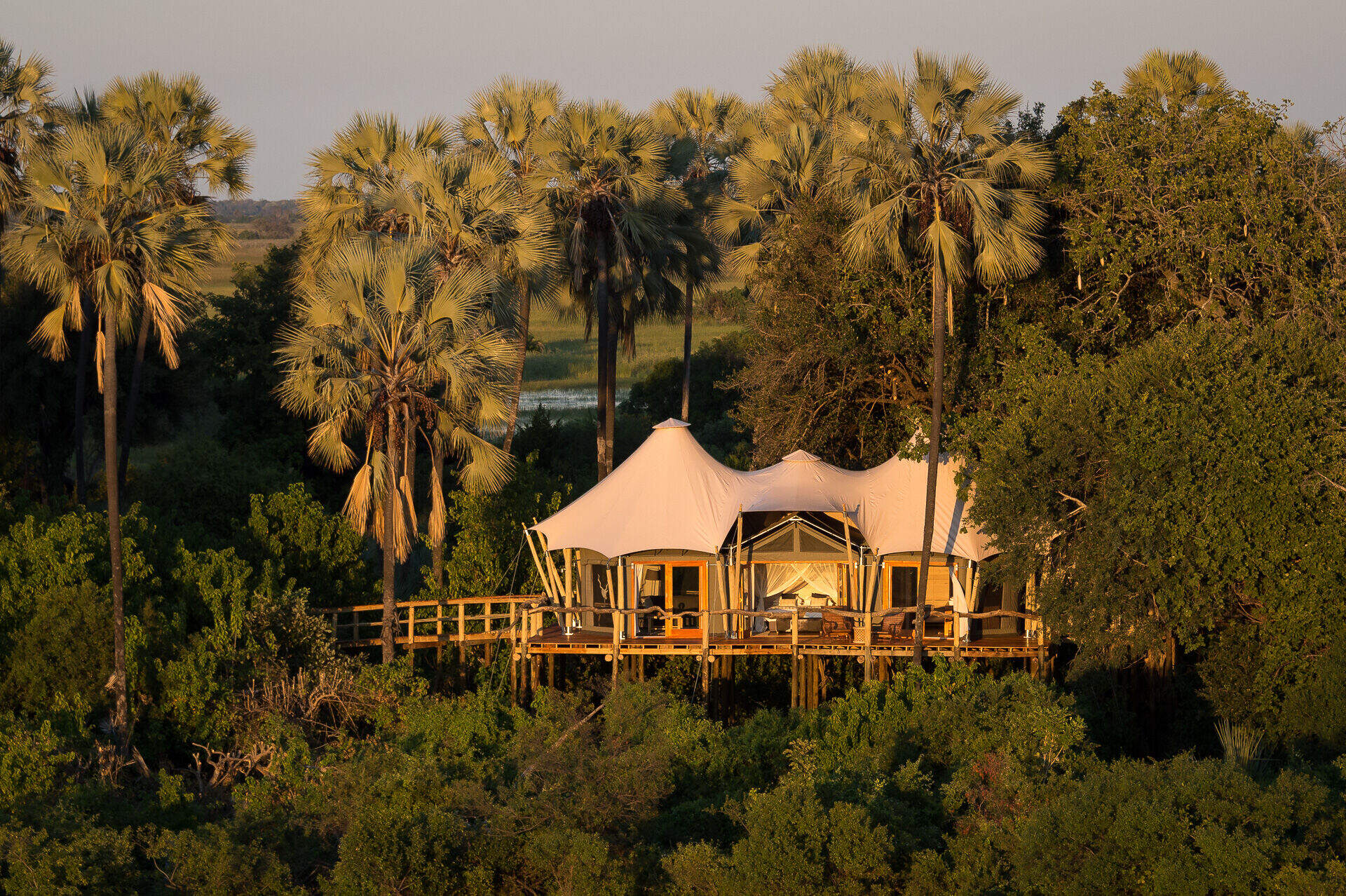
Kwetsani Camp
Deep in the Delta, overlooking a floodplain, Kwetsani Camp is a small, high-end camp with good access to areas for land and water-based activities.
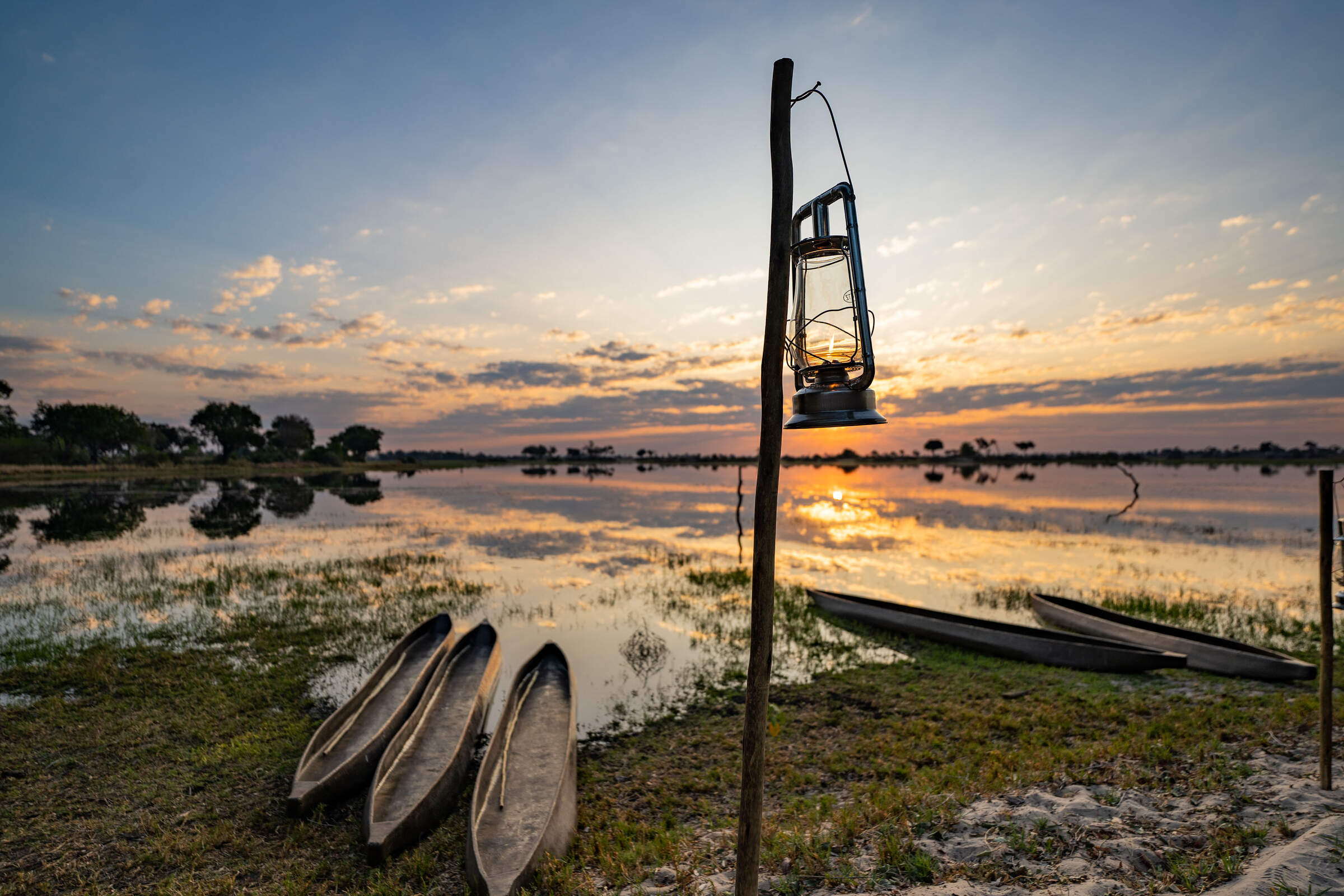
Pom Pom Camp
Amidst stunning Okavango Delta scenery, Pom Pom offers idyllic mokoro trips in season, great birdwatching, and increasingly good big-game sightings, especially leopards.
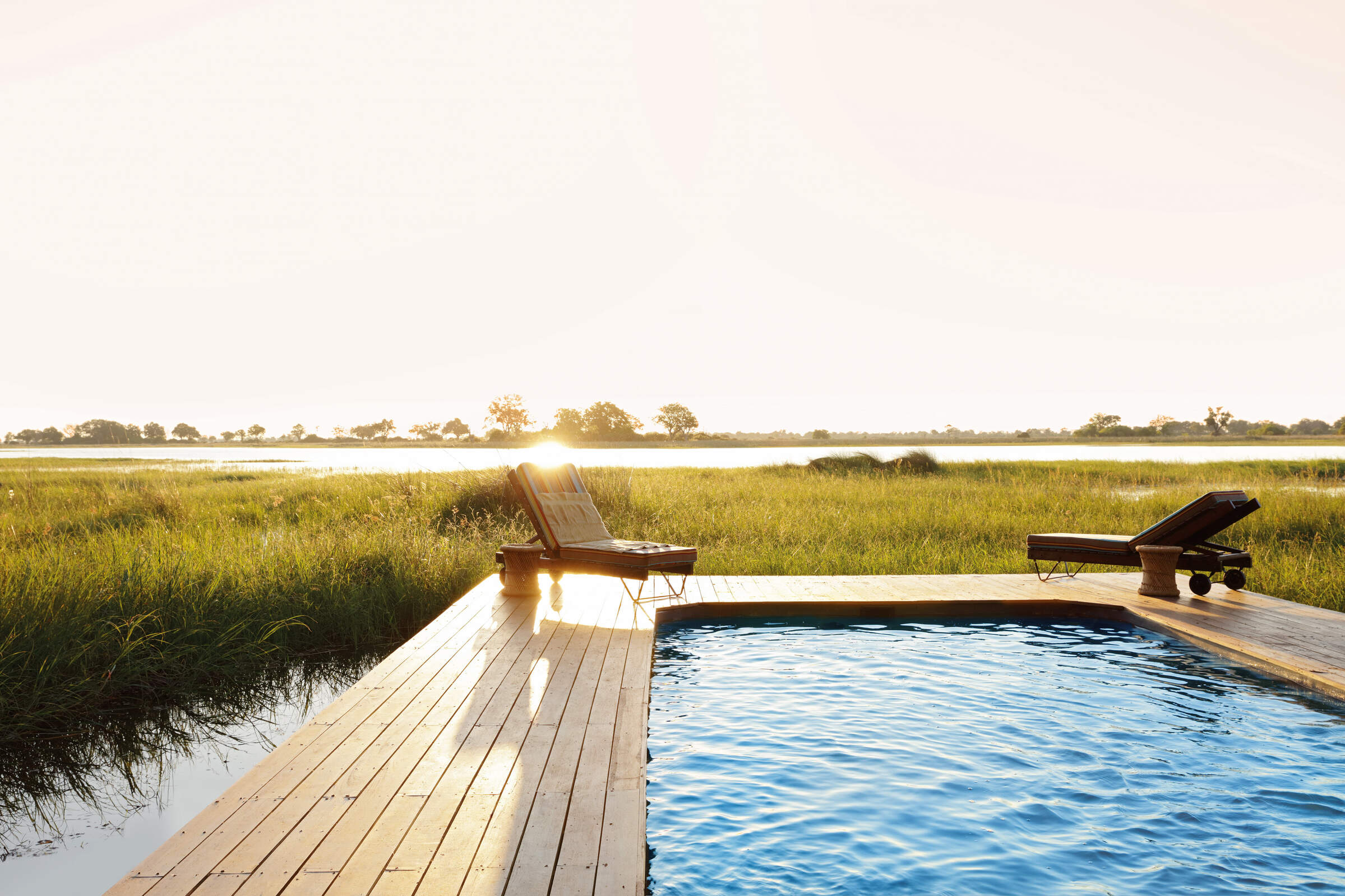
Mapula Lodge
For an affordable yet varied safari encompassing a range of eco-systems, the traditional Mapula Lodge takes a lot of beating.
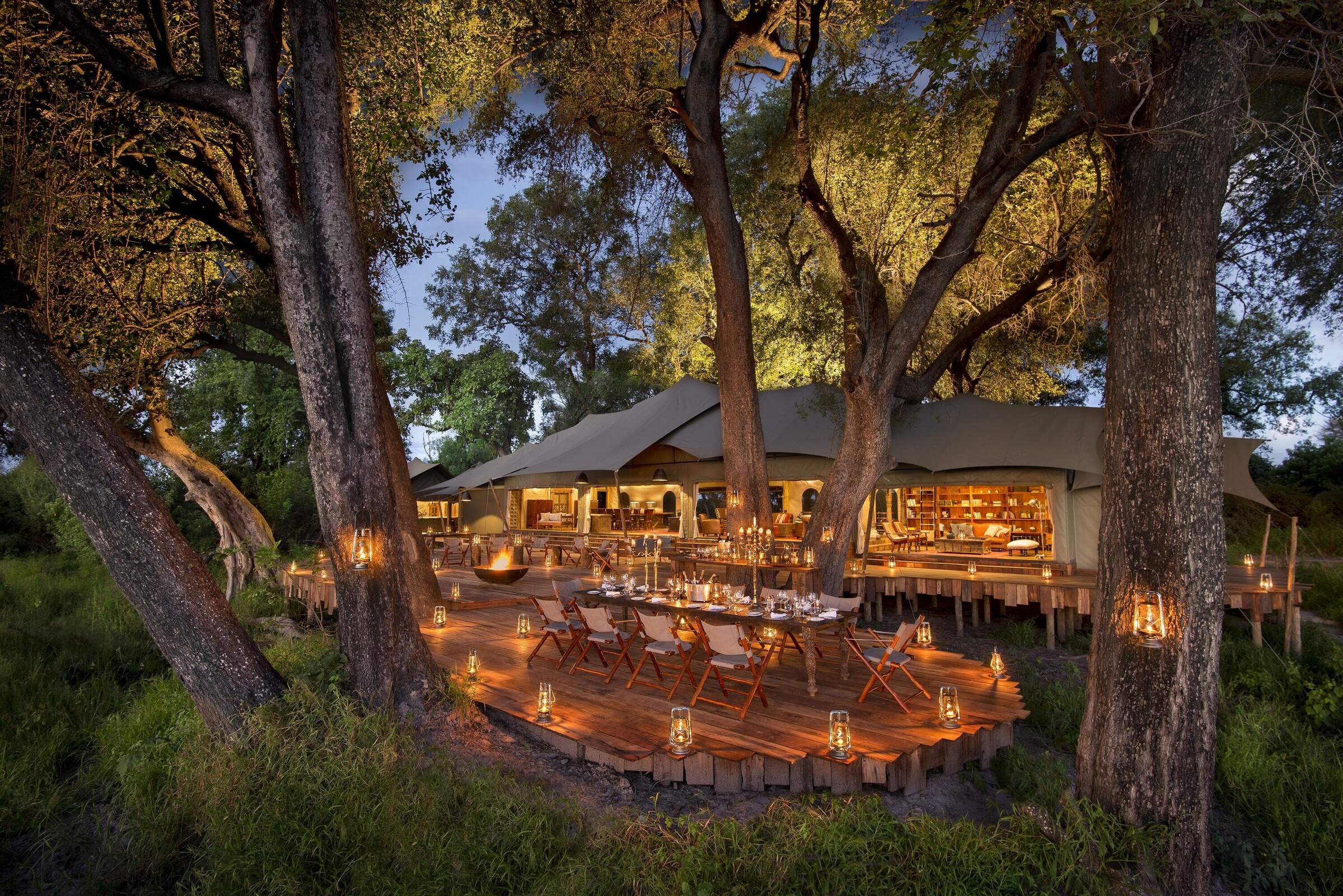
Duba Plains Camp
Duba Plains Camp is a traditional yet luxurious safari camp, best known for the thrilling lion behavior interaction that is often see during the day.
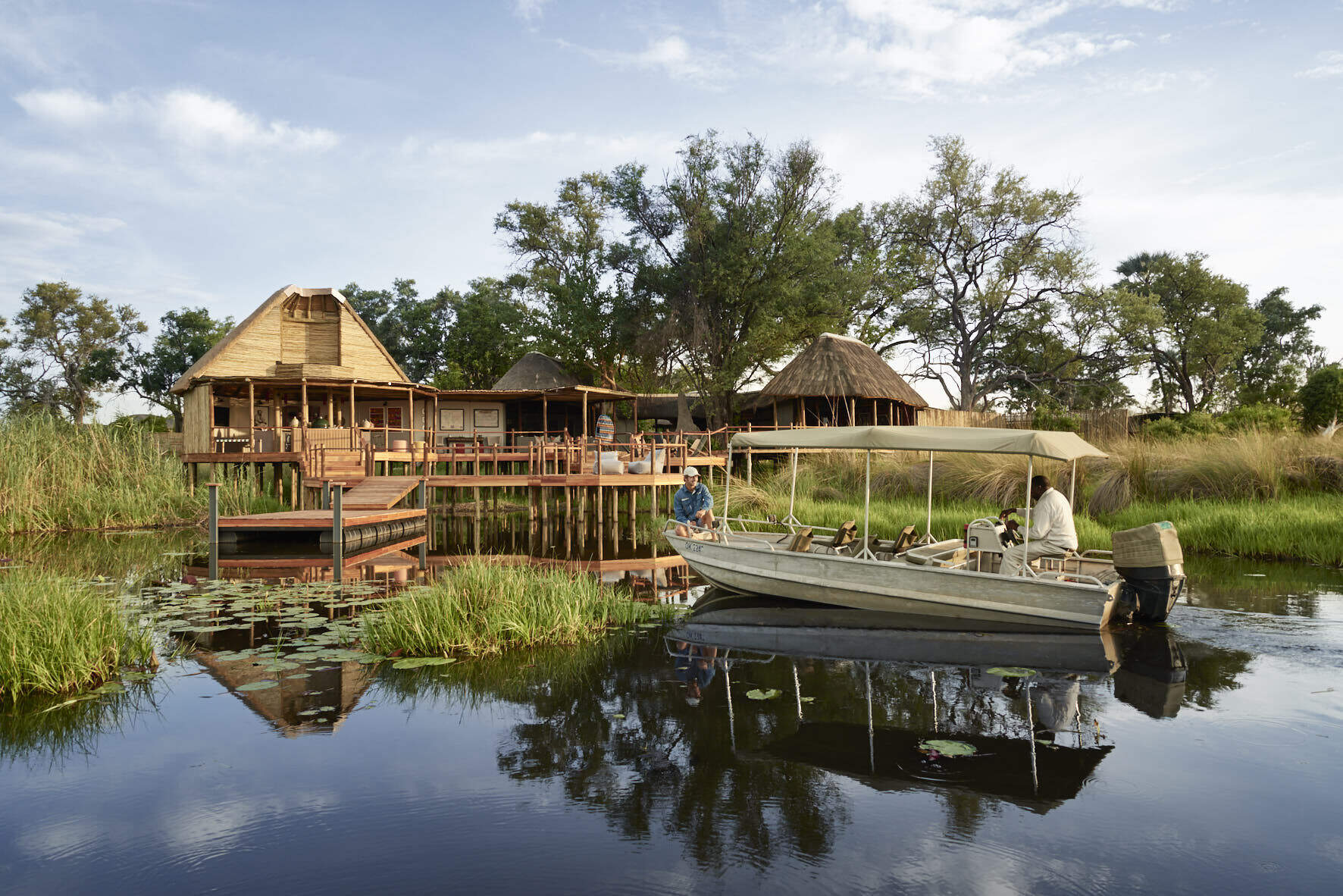
Baines' Camp
Baines' Camp is a well-run, intimate camp in a pretty part of the Okavango, offering a range of activities and the option to spend a morning walking with elephants.
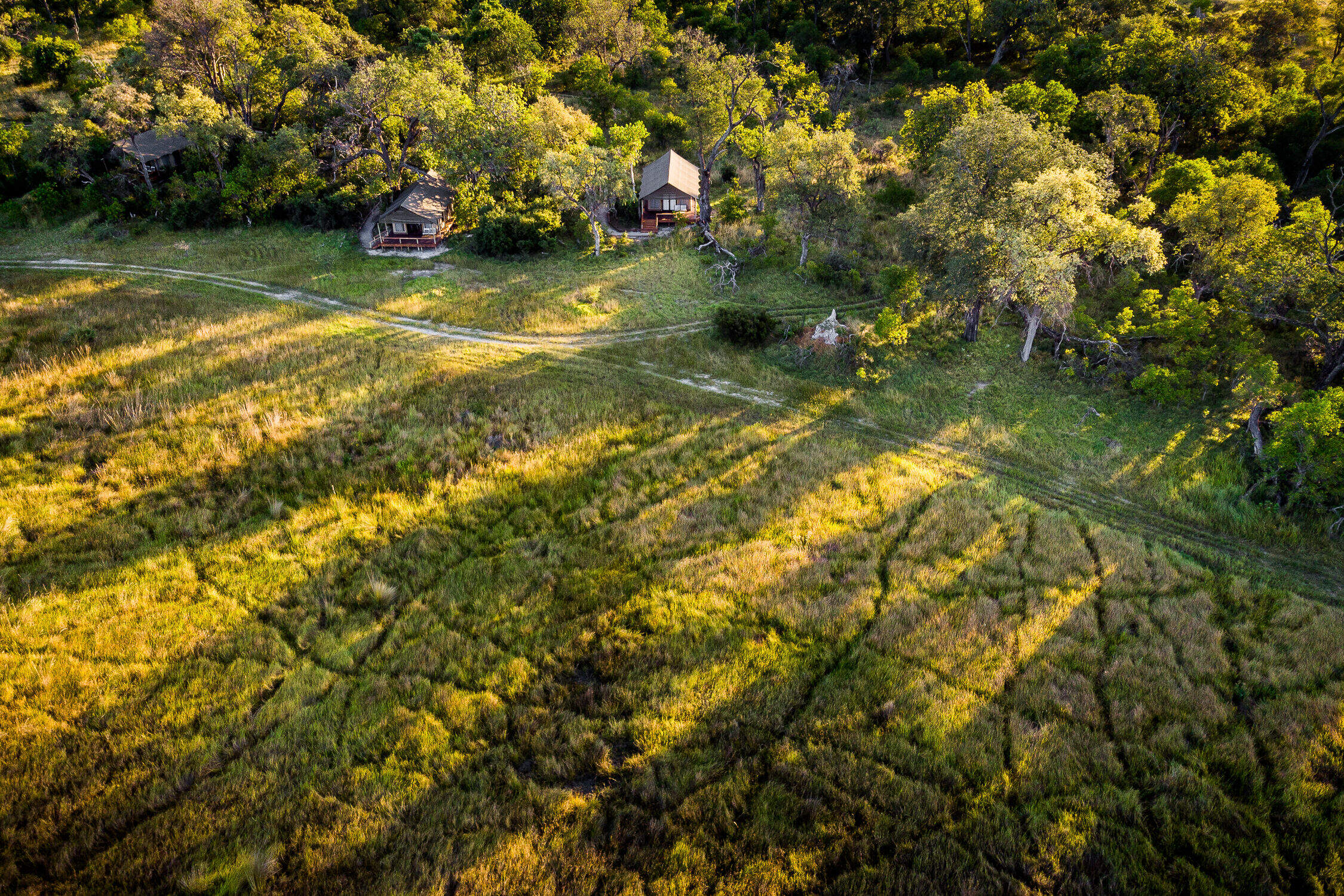
Stanley's Camp
In a private concession south of Moremi Game Reserve, Stanley's Camp offers 4WD game drives, seasonal water activities and a superb elephant interaction.
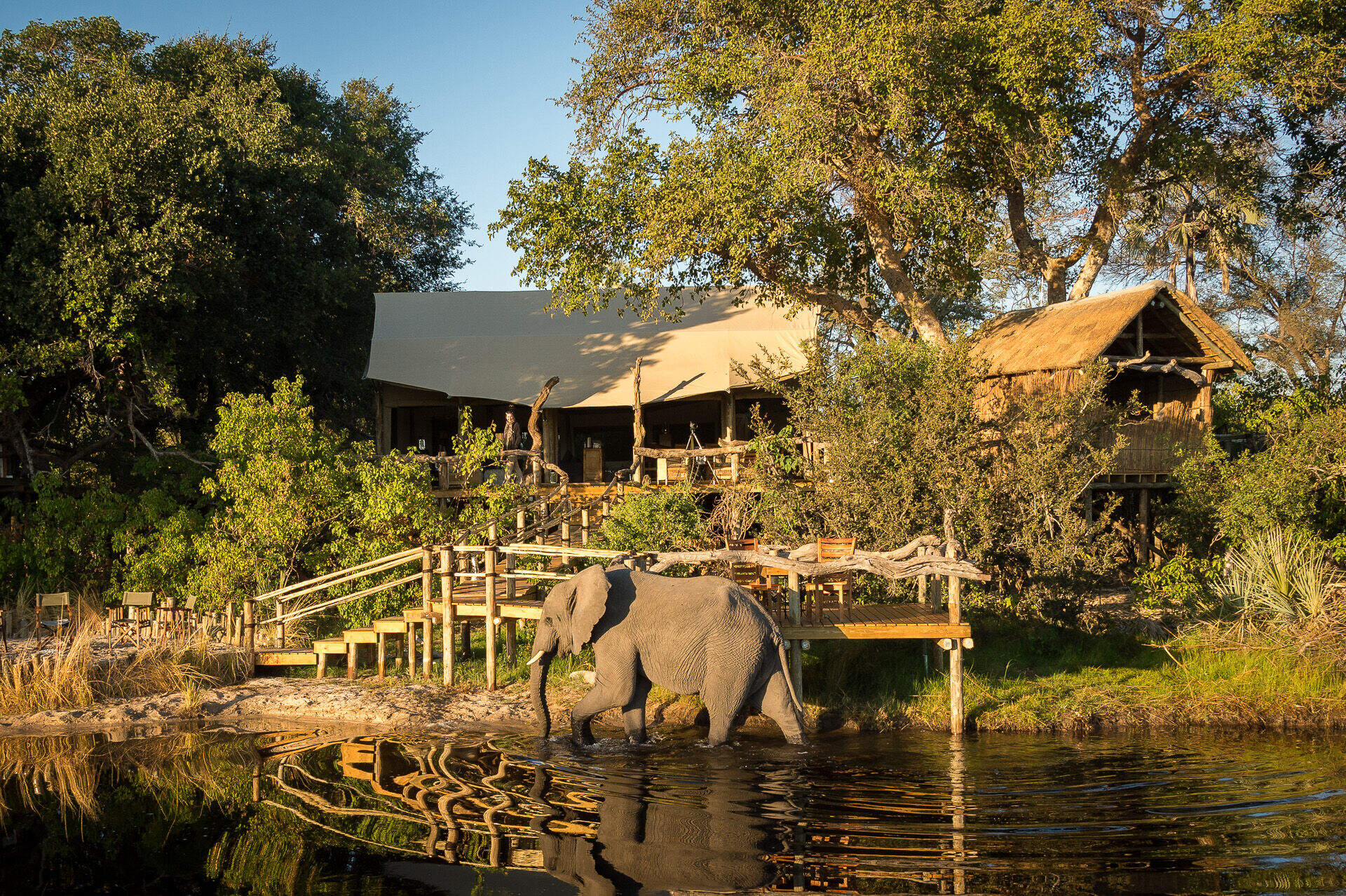
Little Tubu
Little Tubu is a new, traditional camp with just three tented chalets and a distinctive tree-house feel. The areas around it can be explored by water and land-based activities year round.
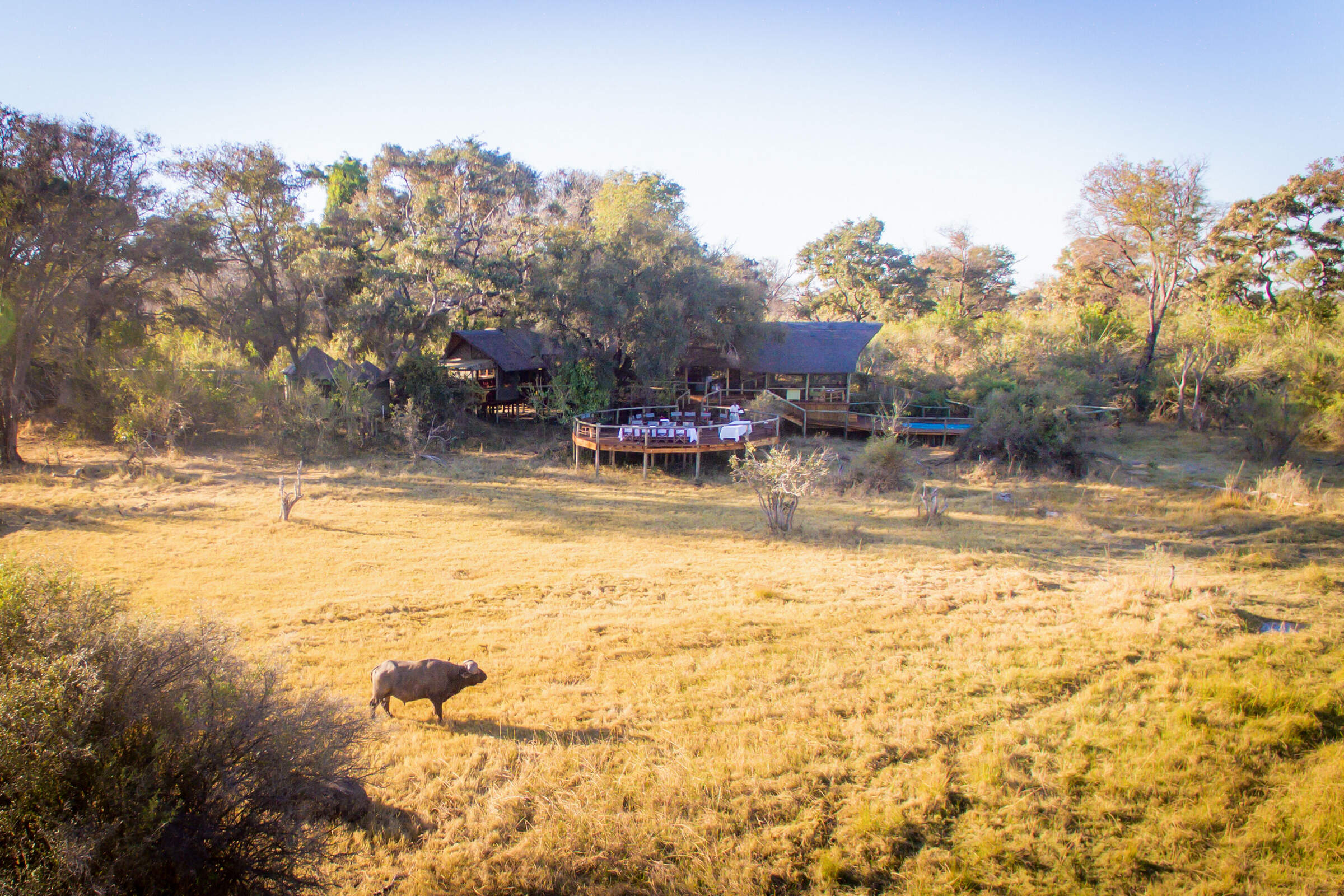
Rra Dinare
Located in a private concession in the southern reaches of the Okavango Delta, overlooking the Gomoti River, Rra Dinare is a traditional-style, well-priced camp.
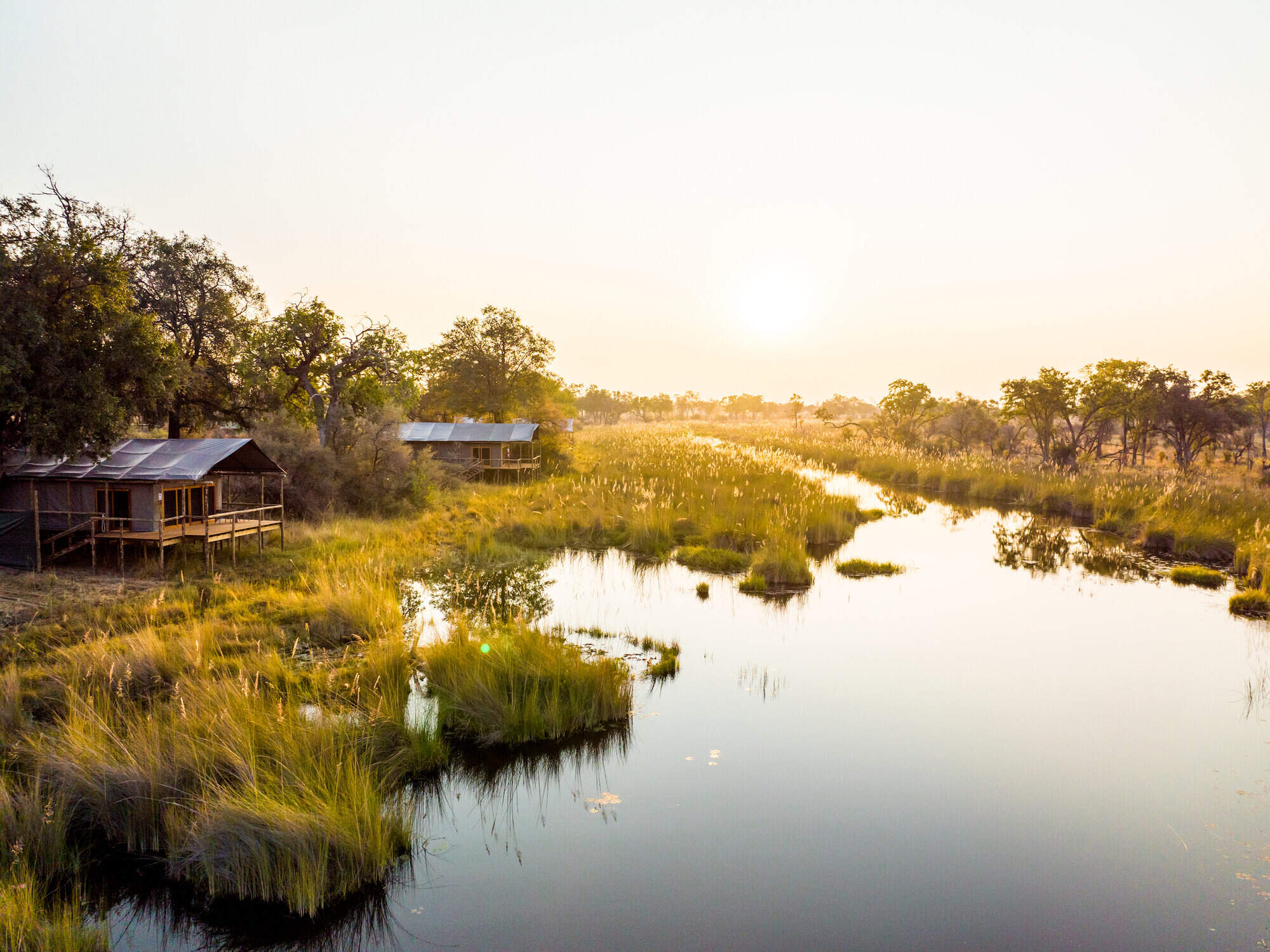
4 Rivers
4 Rivers is a new camp in a previously in accessible area of the excellent Kwara concession.
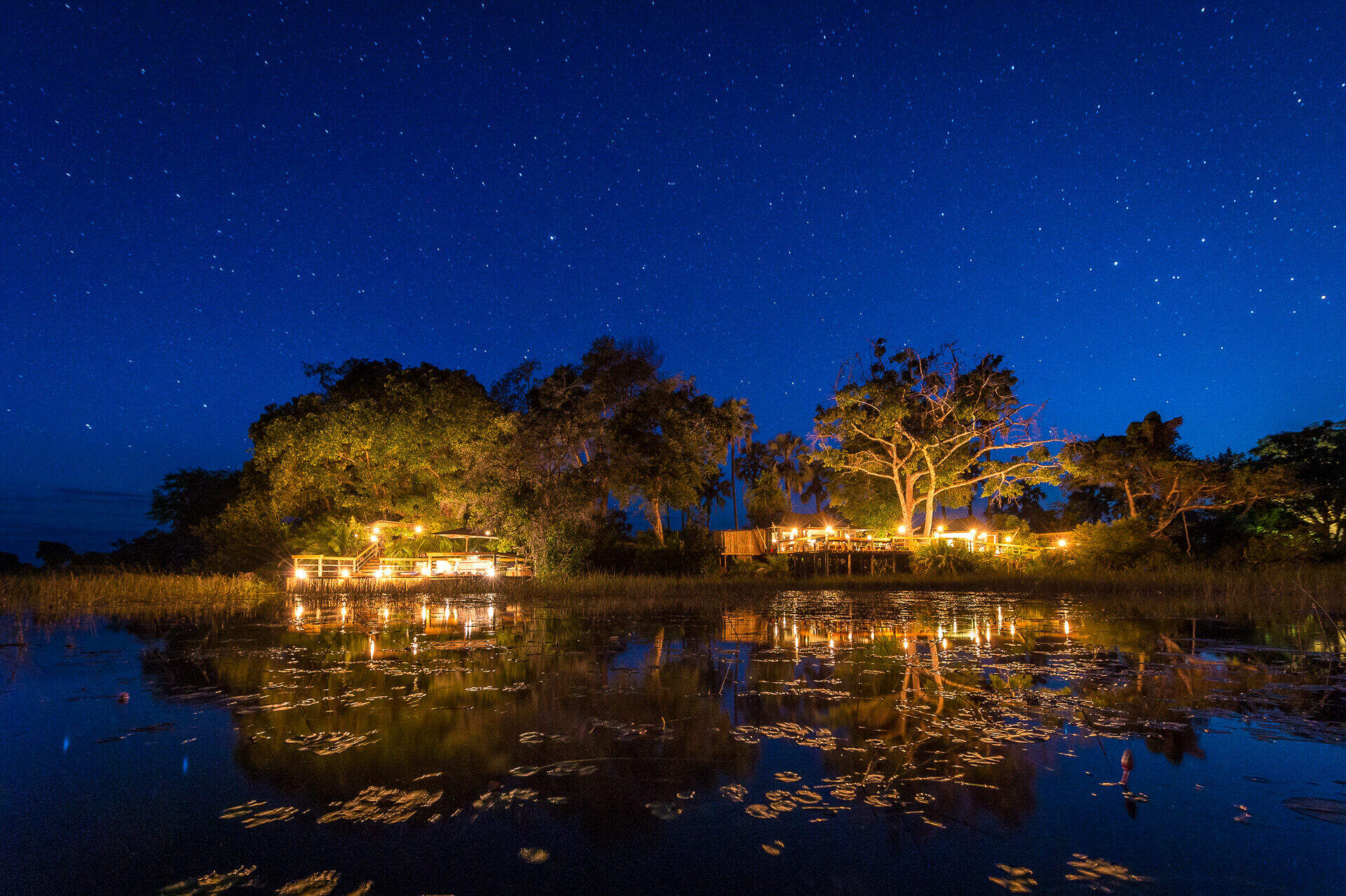
Pelo Camp
In a pristine wilderness environment deep in the Okavango Delta, the seasonal Pelo Camp is tented yet comfortable, with activities focusing on excursions by mokoro.
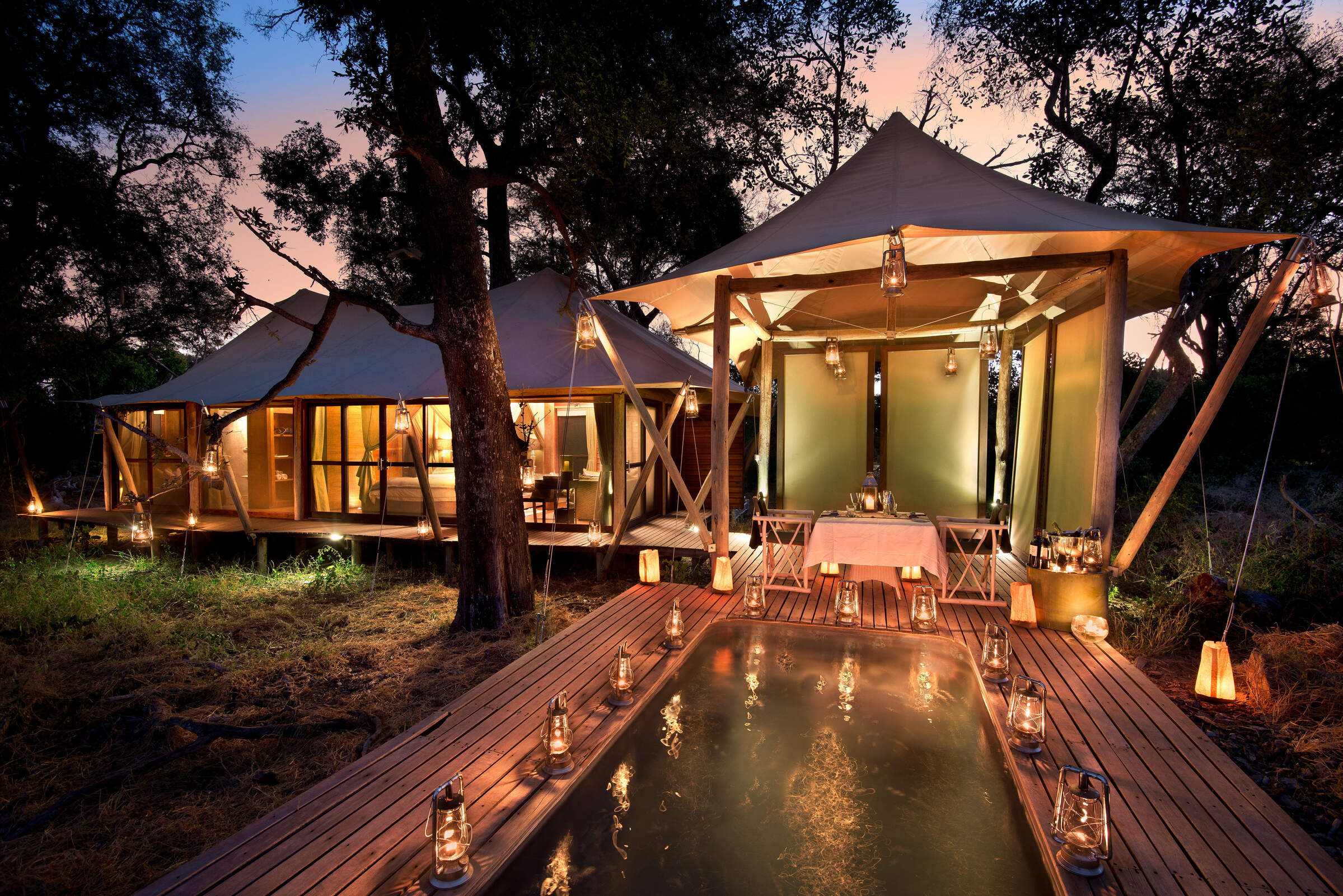
Xaranna
Xaranna is a plush tented camp amongst the idyllic waterways and islands of the Delta. Each air-conditioned tent has a plunge pool. Water activities and pampering are the focus here.
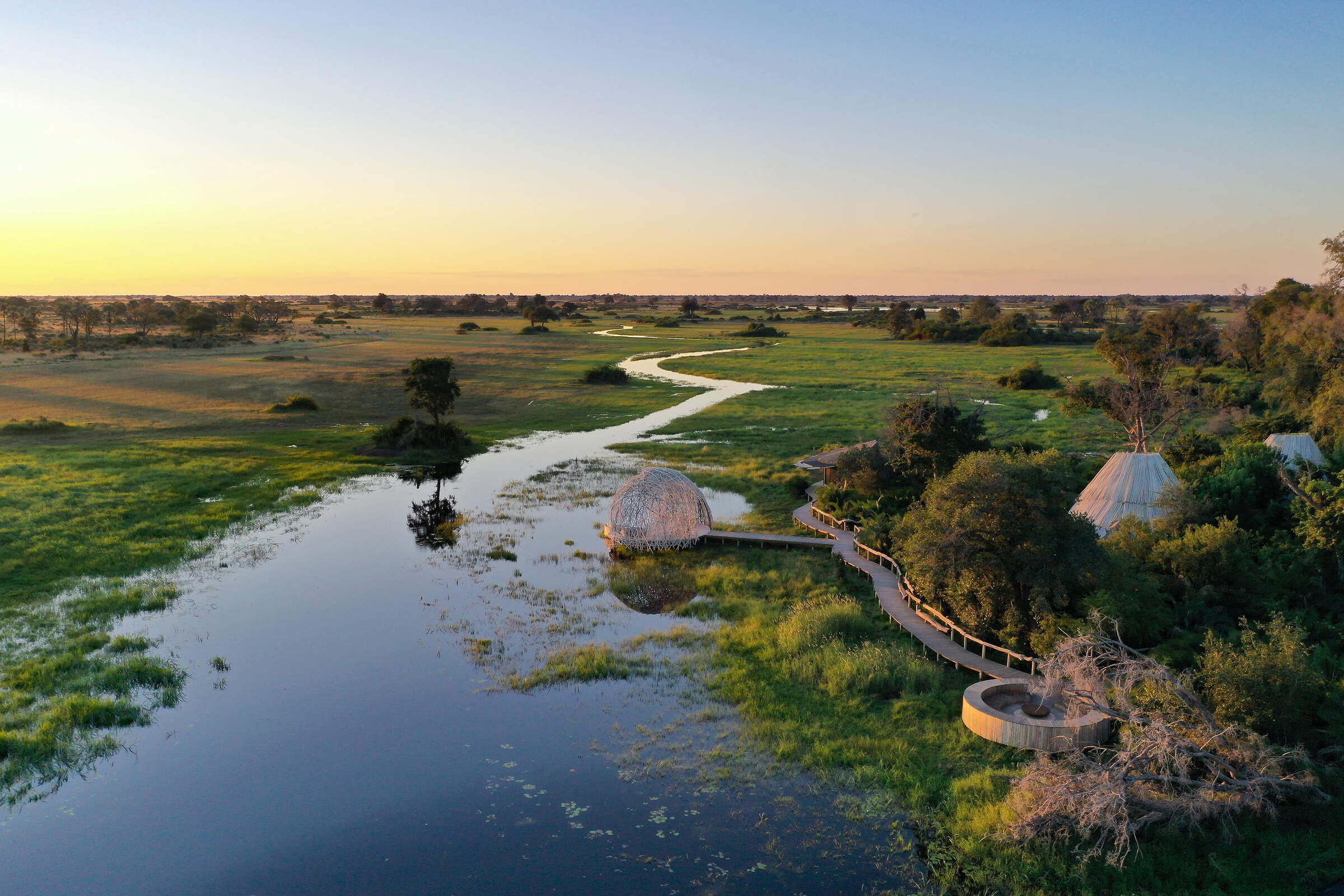
Jao Camp
In a beautiful area with fantastic water activities, Jao combines an idyllic location with high levels of luxury and service, and a top-end spa.
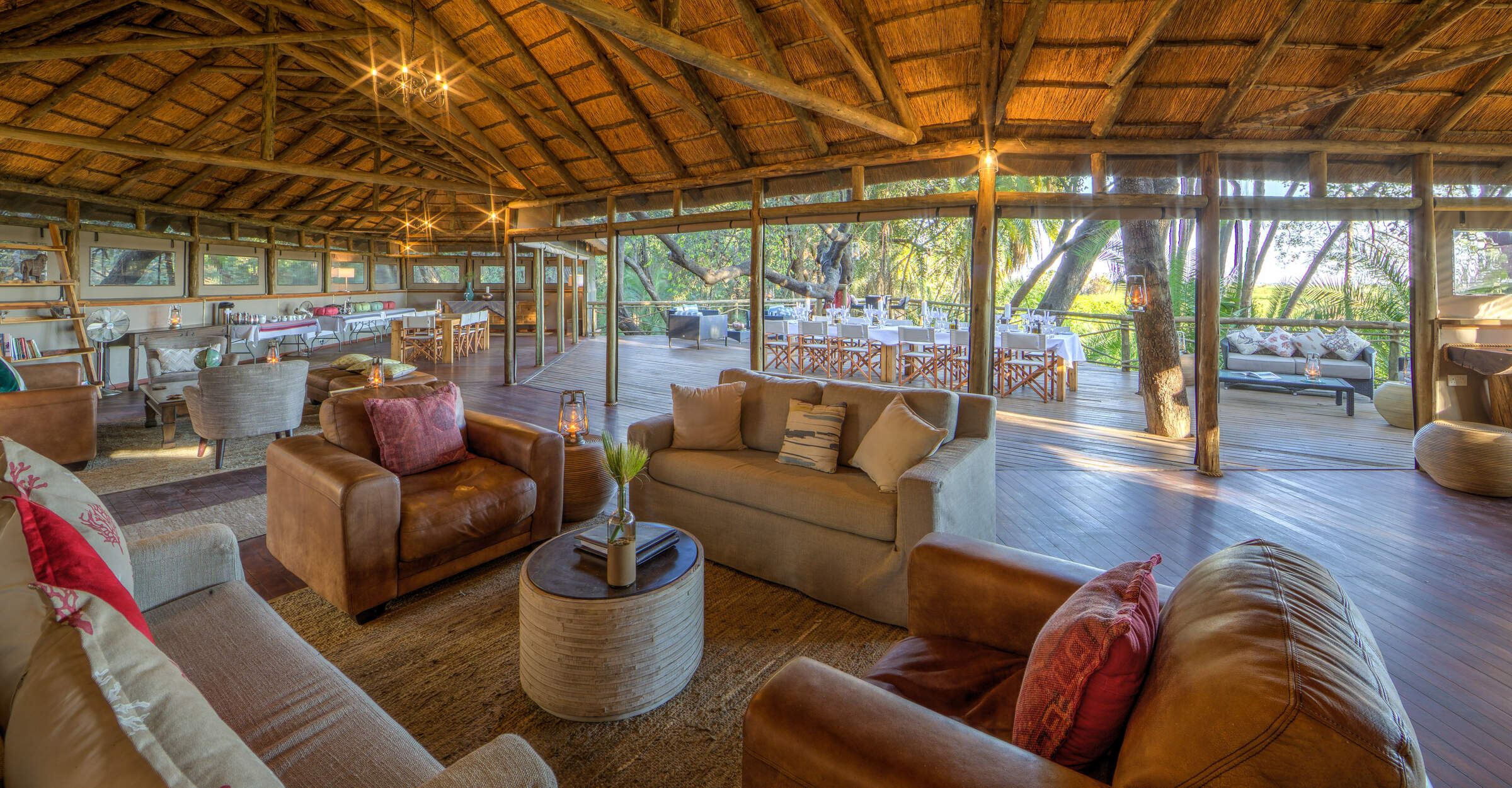
Setari Camp
Setari Camp stands on an island dotted with palm trees, close to the base of the Okavango's 'Panhandle", offering primarily water-based activities.
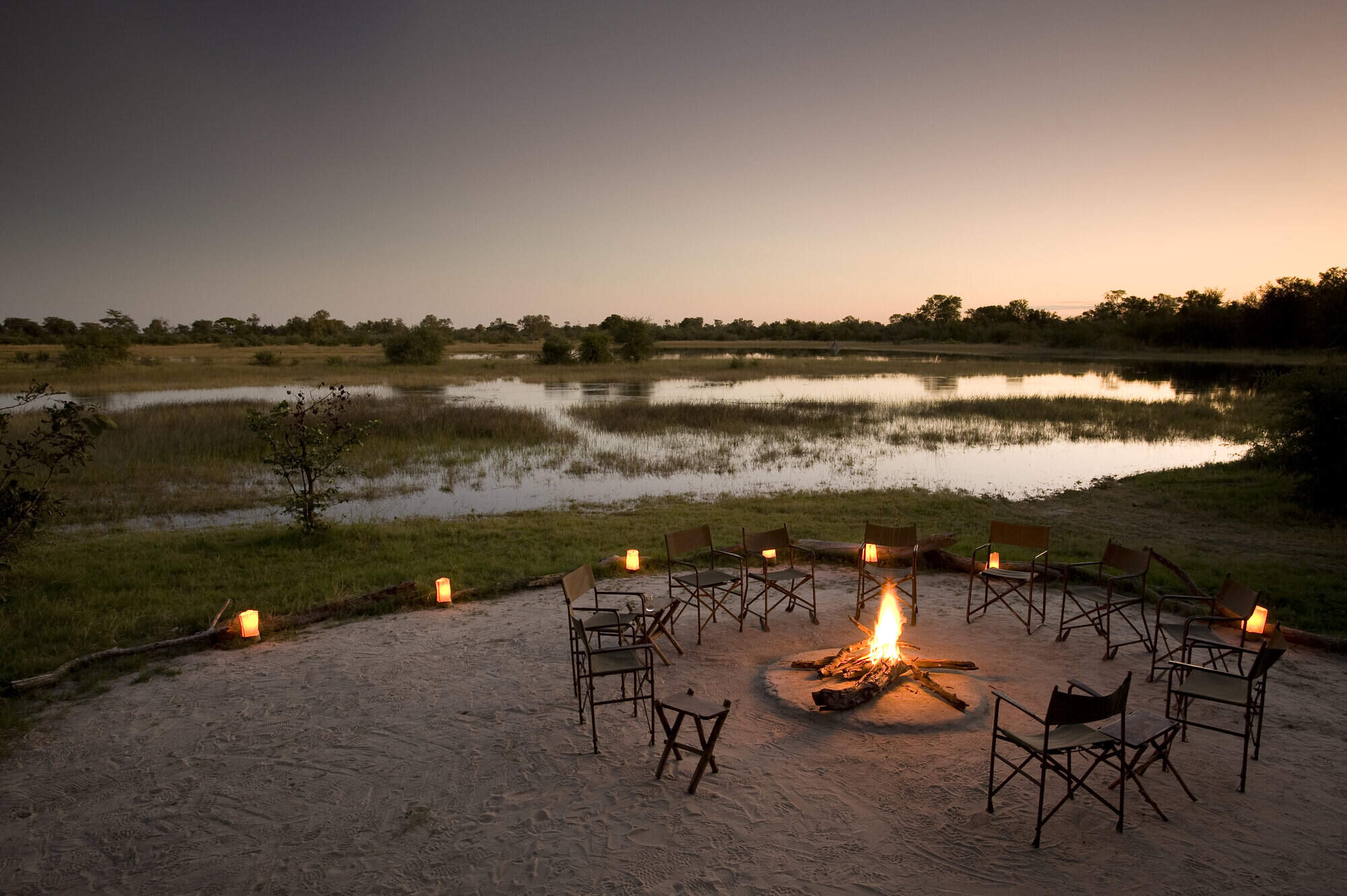
Okavango Explorers
The traditional, tented Okavango Explorers Camp offers a mix of walking, canoeing and game drives led by great guides in a wildlife-rich area.
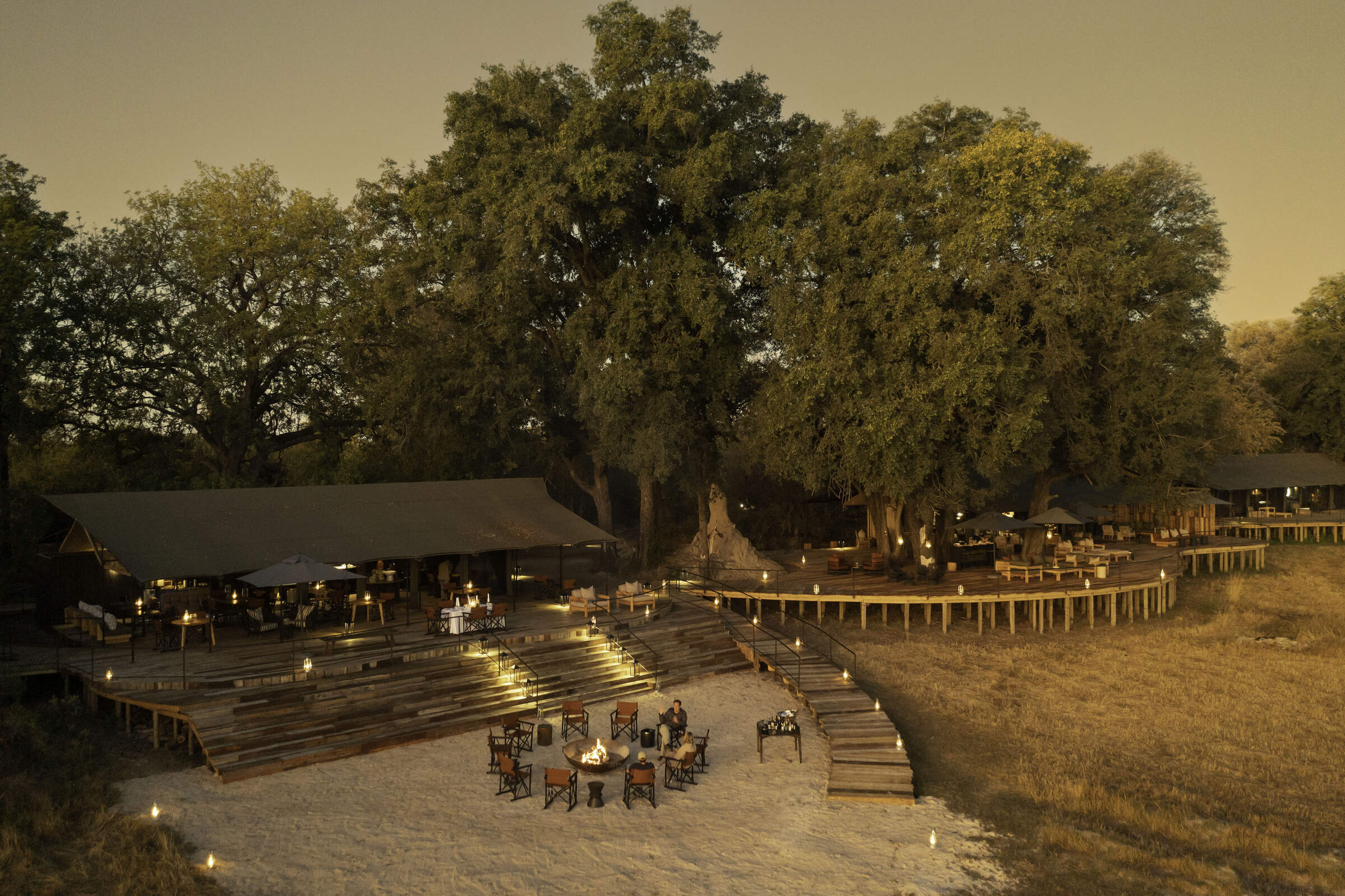
Kiri Camp
Kiri Camp is the latest Okavango offering from the excellent team behind Machaba. In an exciting new location in the heart of the Delta we cannot wait to visit this new camp.
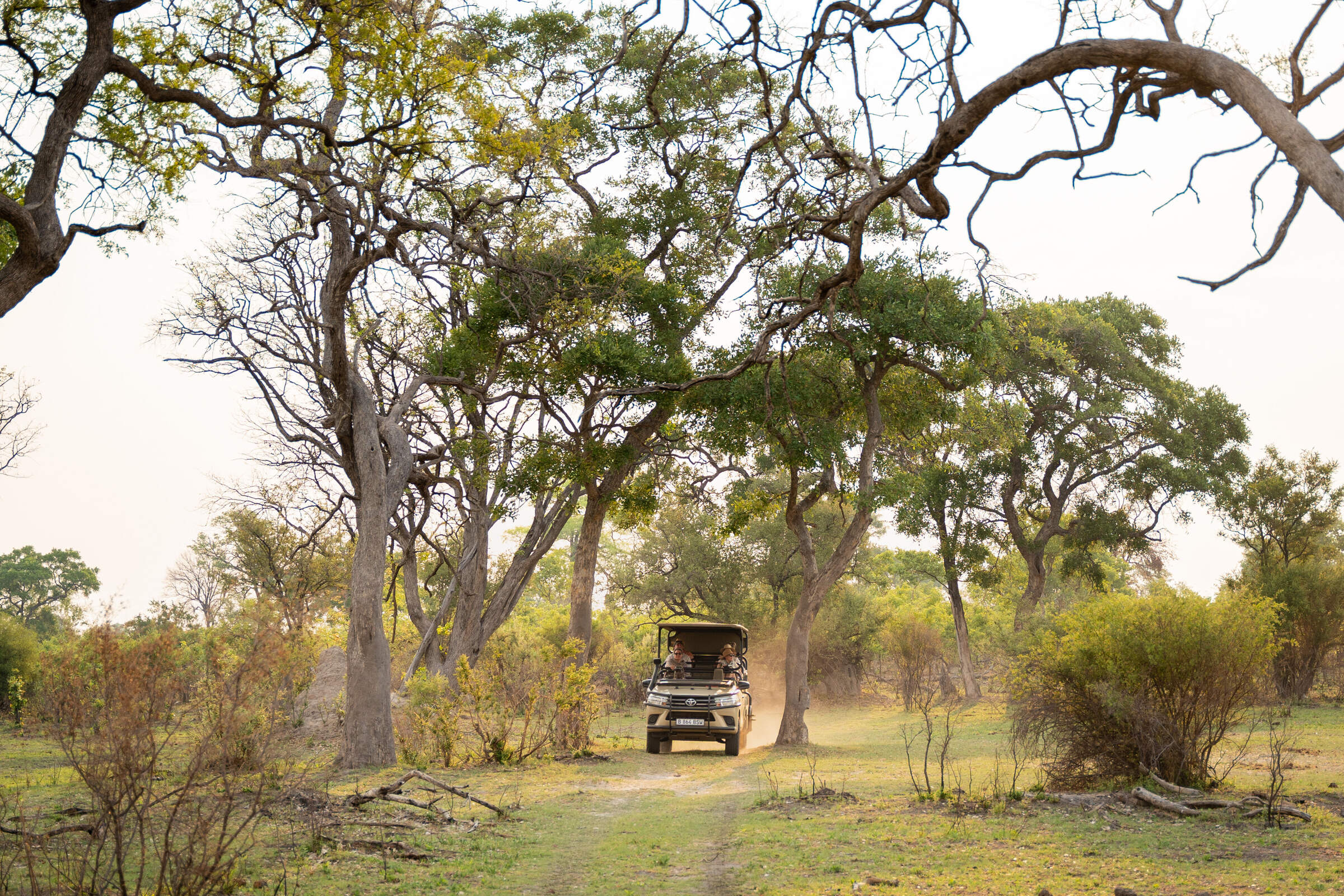
Karangoma
New for 2024, Karangoma is a classic, tented camp offering walking, canoeing and game drives, in partnership with the local Bukakwe San clan.
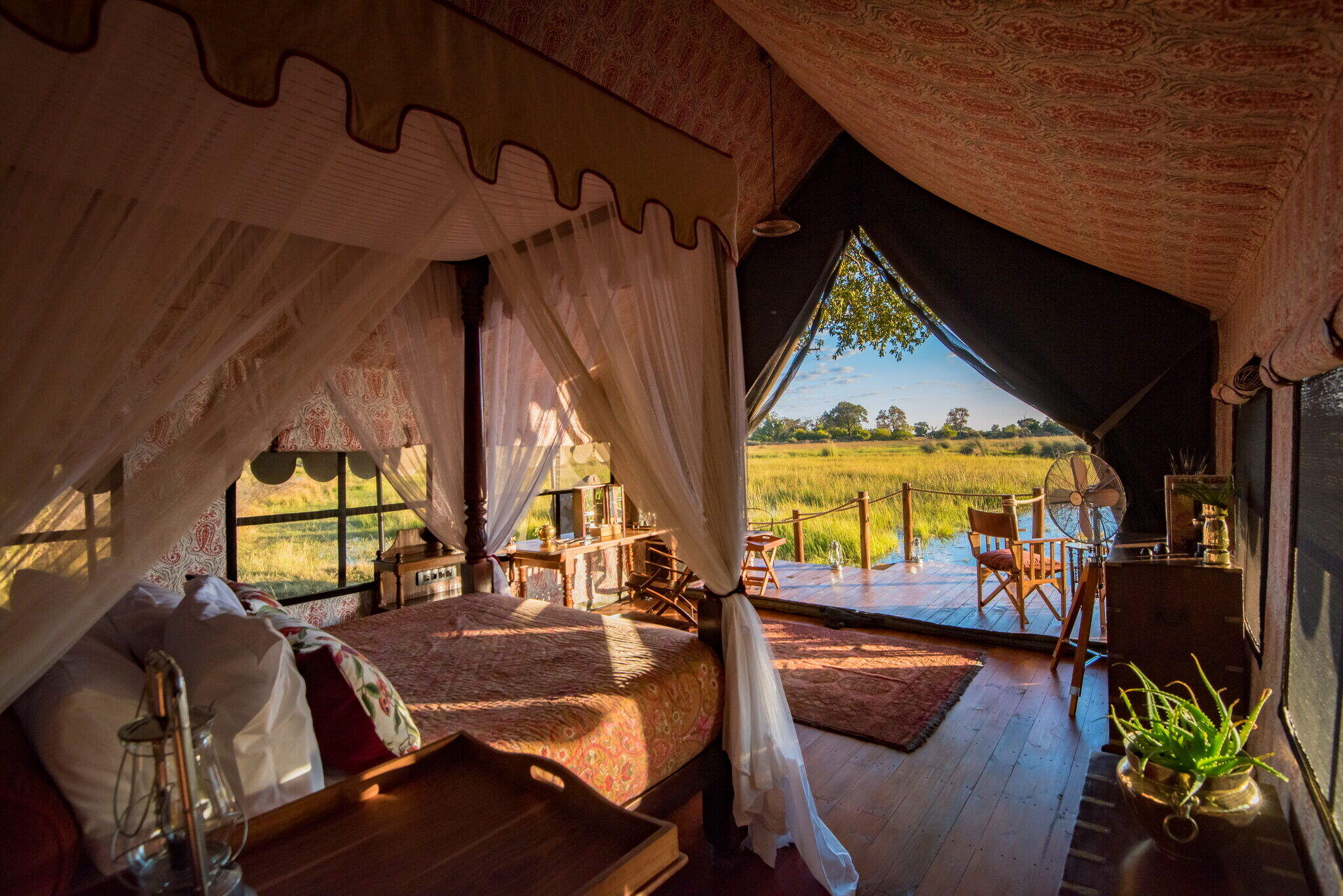
Duke’s Camp
On a remote island within a large concession, the romantic Duke's Camp and smaller Duke’s East are nestled among mature trees overlooking wildlife-rich plains and waterways of the Okavango.
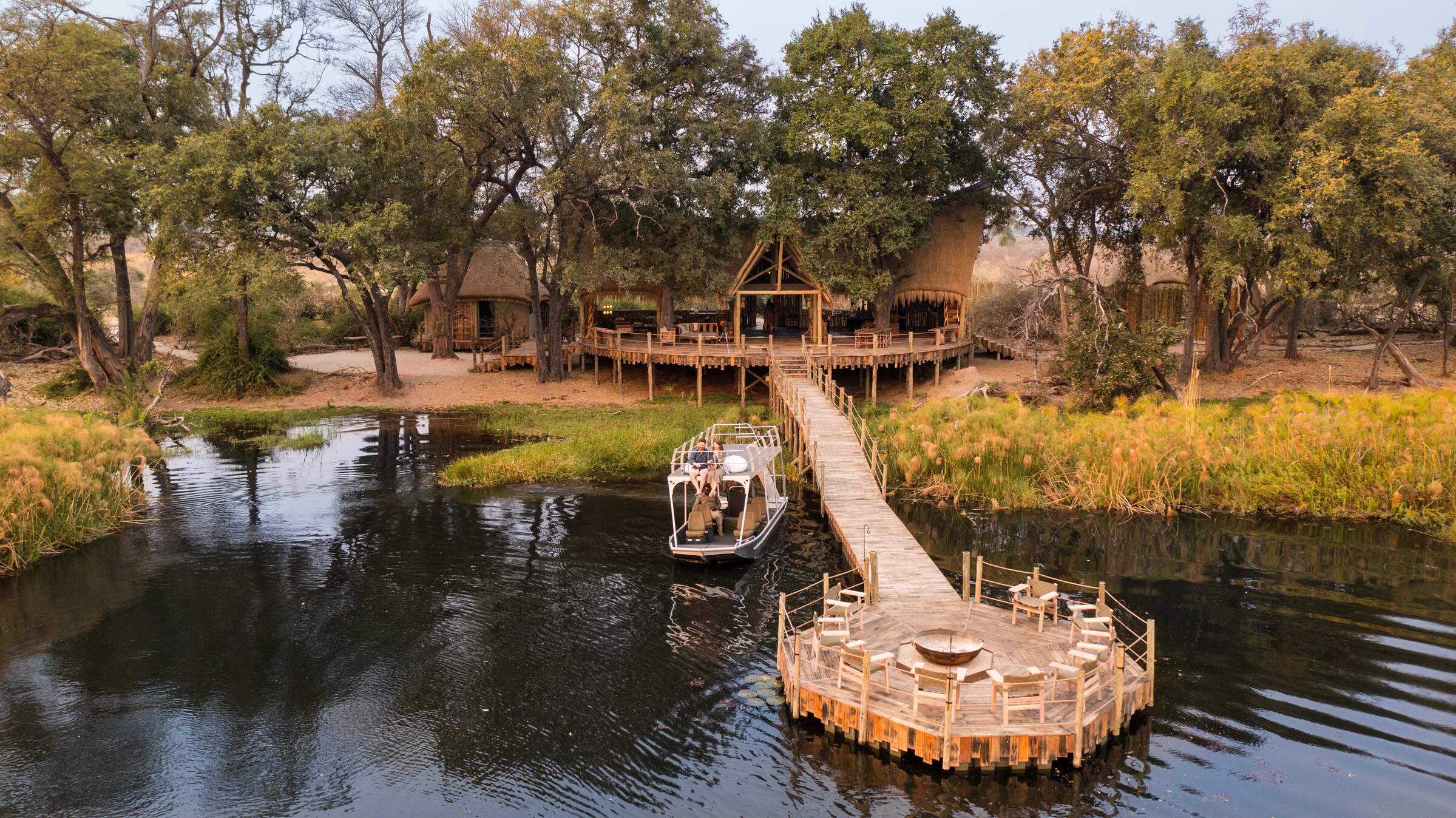
Sitatunga Island Camp
Tucked away in a pristine corner of the Okavango Delta, the exclusive Sitatunga Private Island is a water-based camp offering boating, mokoro trips and fishing.
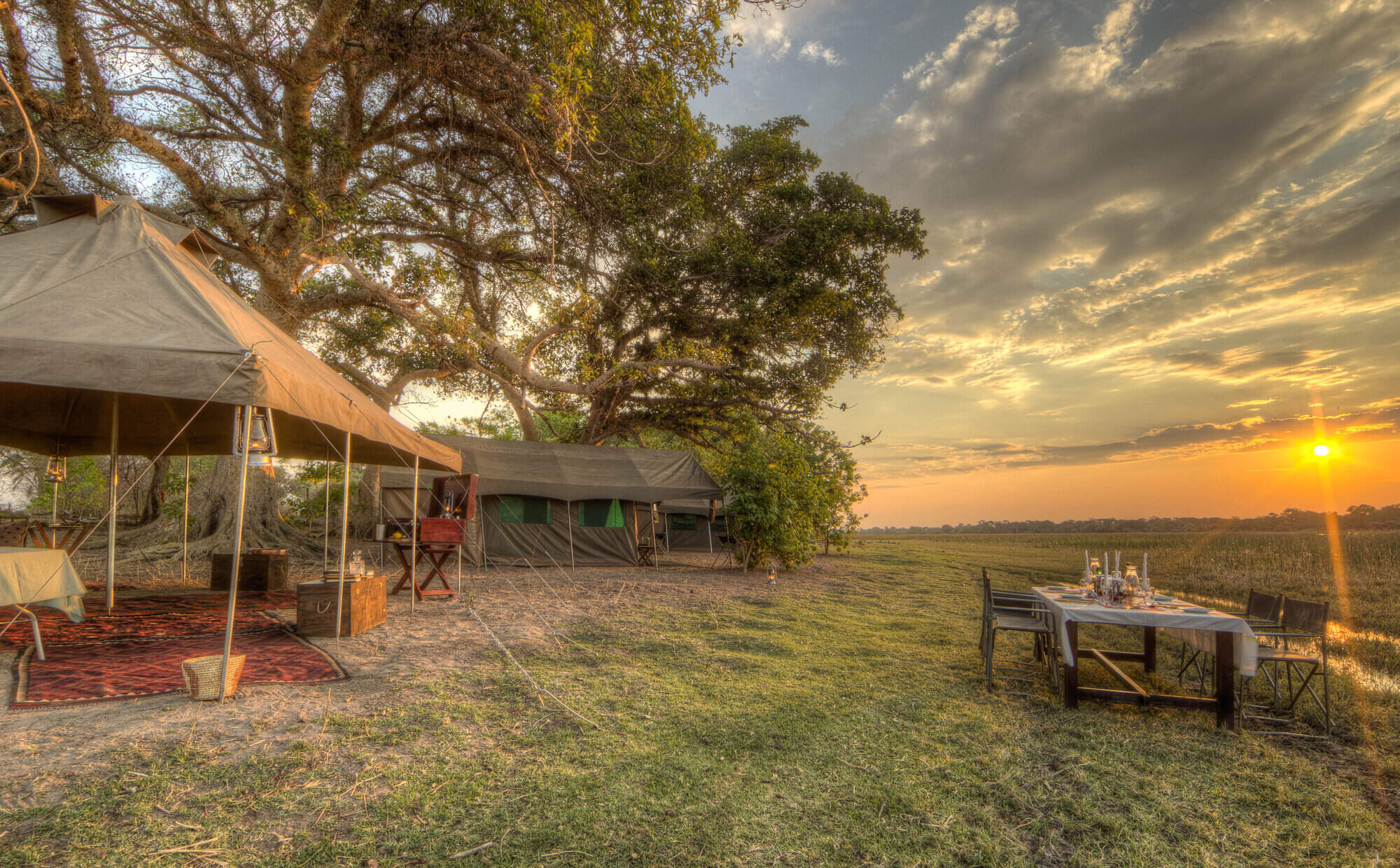
Okavango Walking Safari
The Okavango Delta Walking Safari camps in a secluded Okavango Delta Reserve where there are few roads; the ideal location for a walking trail led by an expert guide.
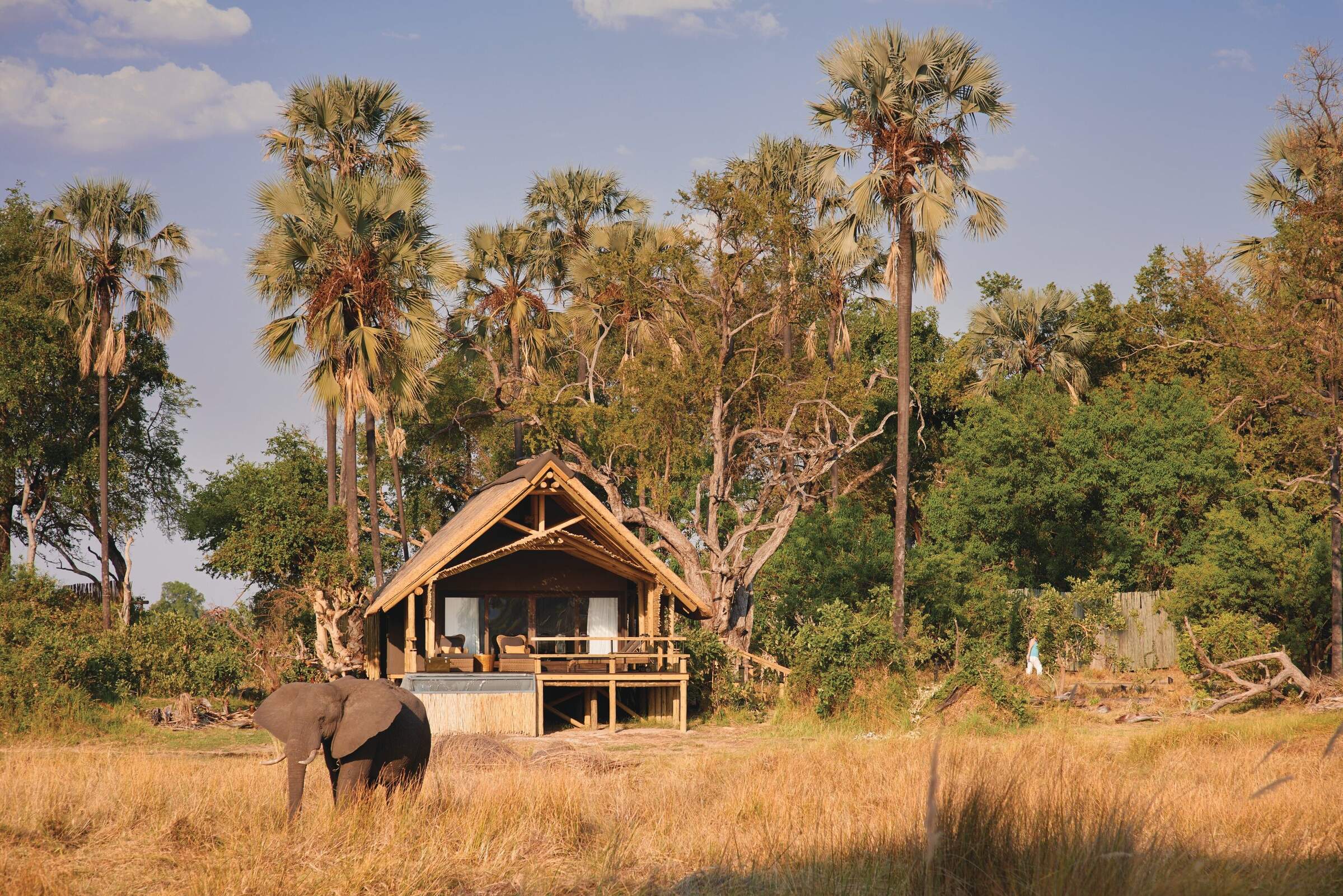
Eagle Island Lodge
Eagle Island Lodge is a luxurious camp with international-style facilities including air conditioning and intercom in each room; offering water based activities in the Okavango Delta.
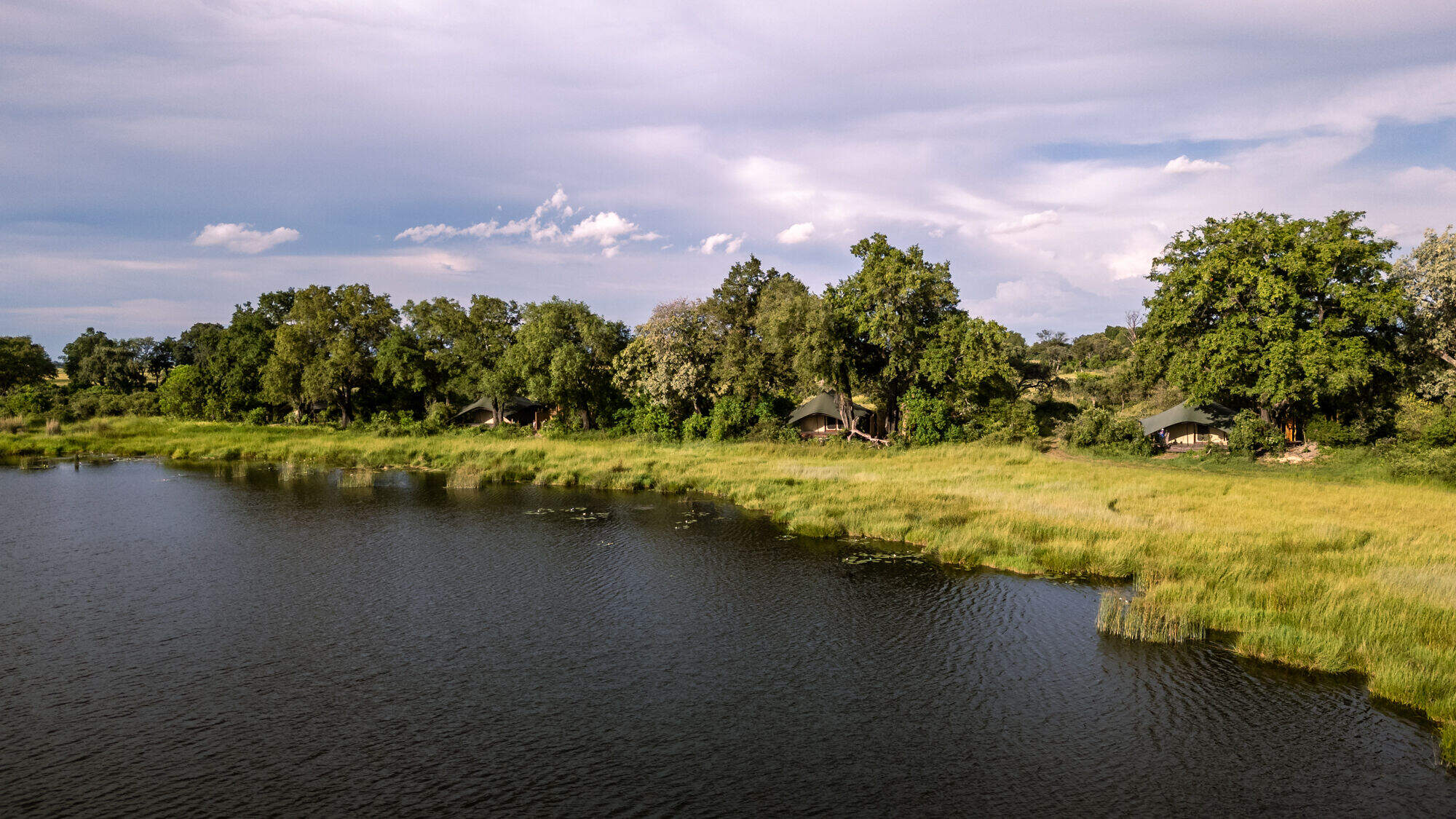
Maxa
Overlooking the permanent Maxa Lagoon, Maxa has a range of activities on offer, combining understated luxury with comfort in a remote location.
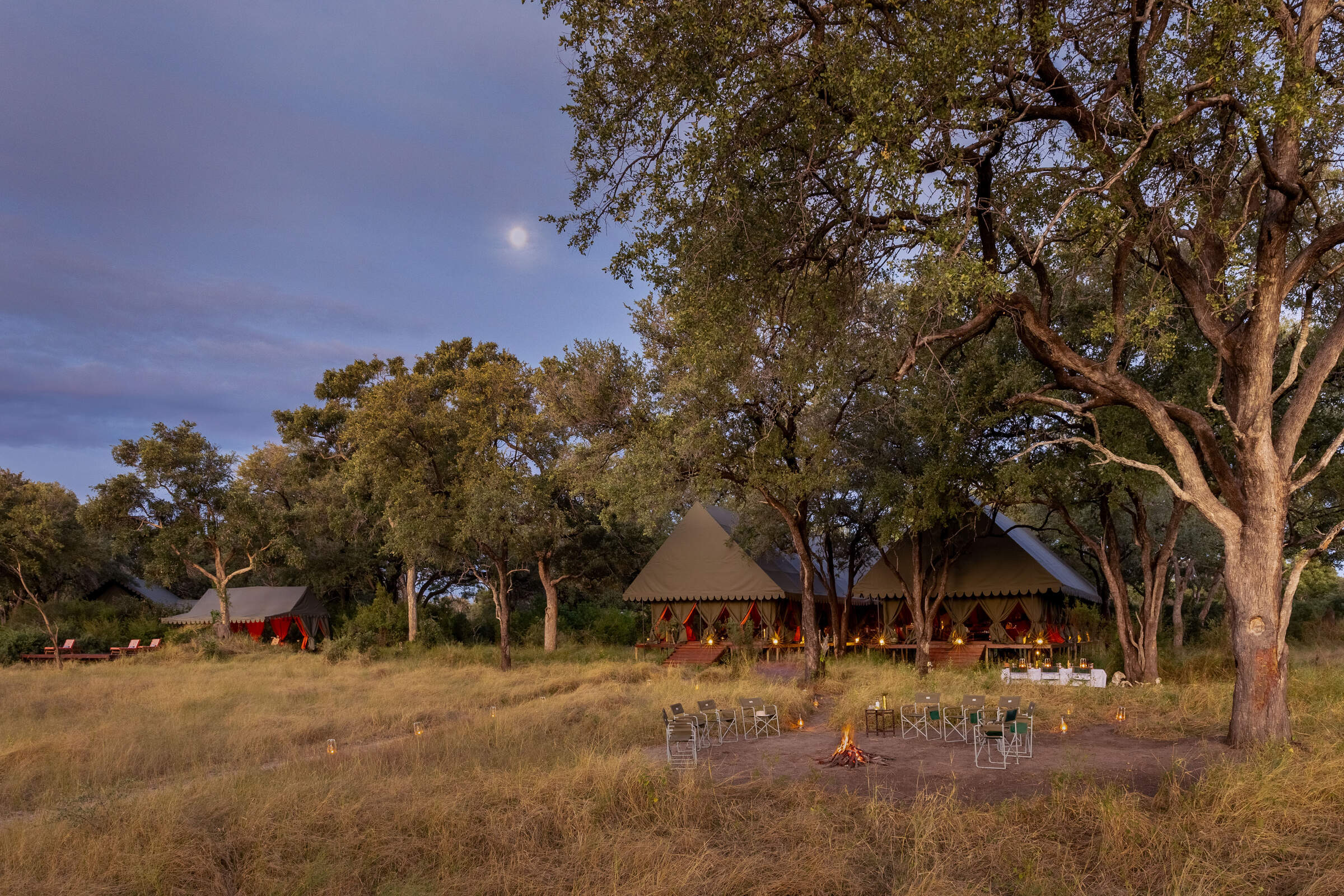
Mbamba
Deep within the northern Okavango, the classically styled Mbamba is located in the same wildlife-rich private concession as its sister camp Dukes.
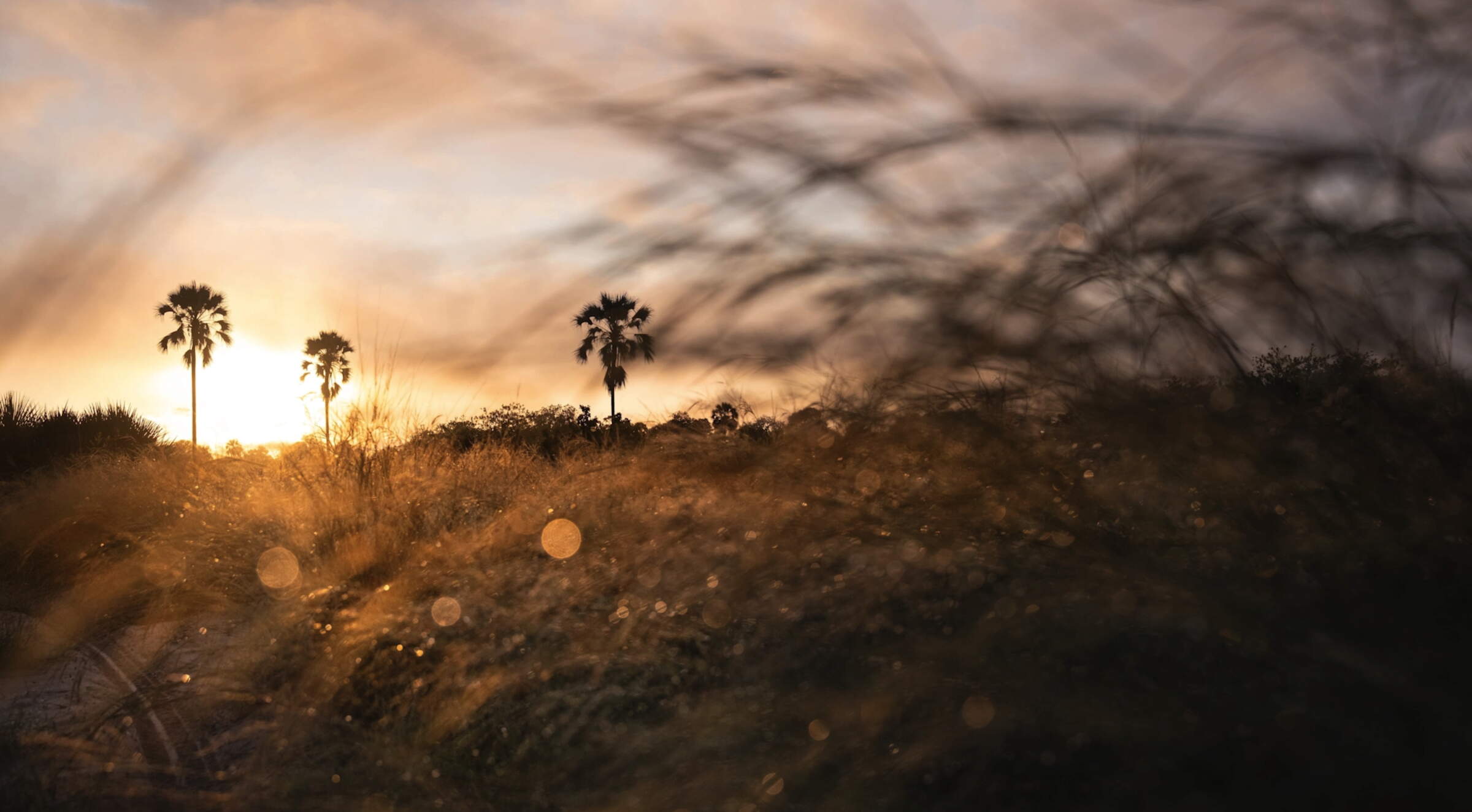
Singita Elela
Singita Elela is an exclusive safari camp on the western side of the Botswana's Okavango Delta - offering superb wildlife and water based opportunities depending on the seasonality.
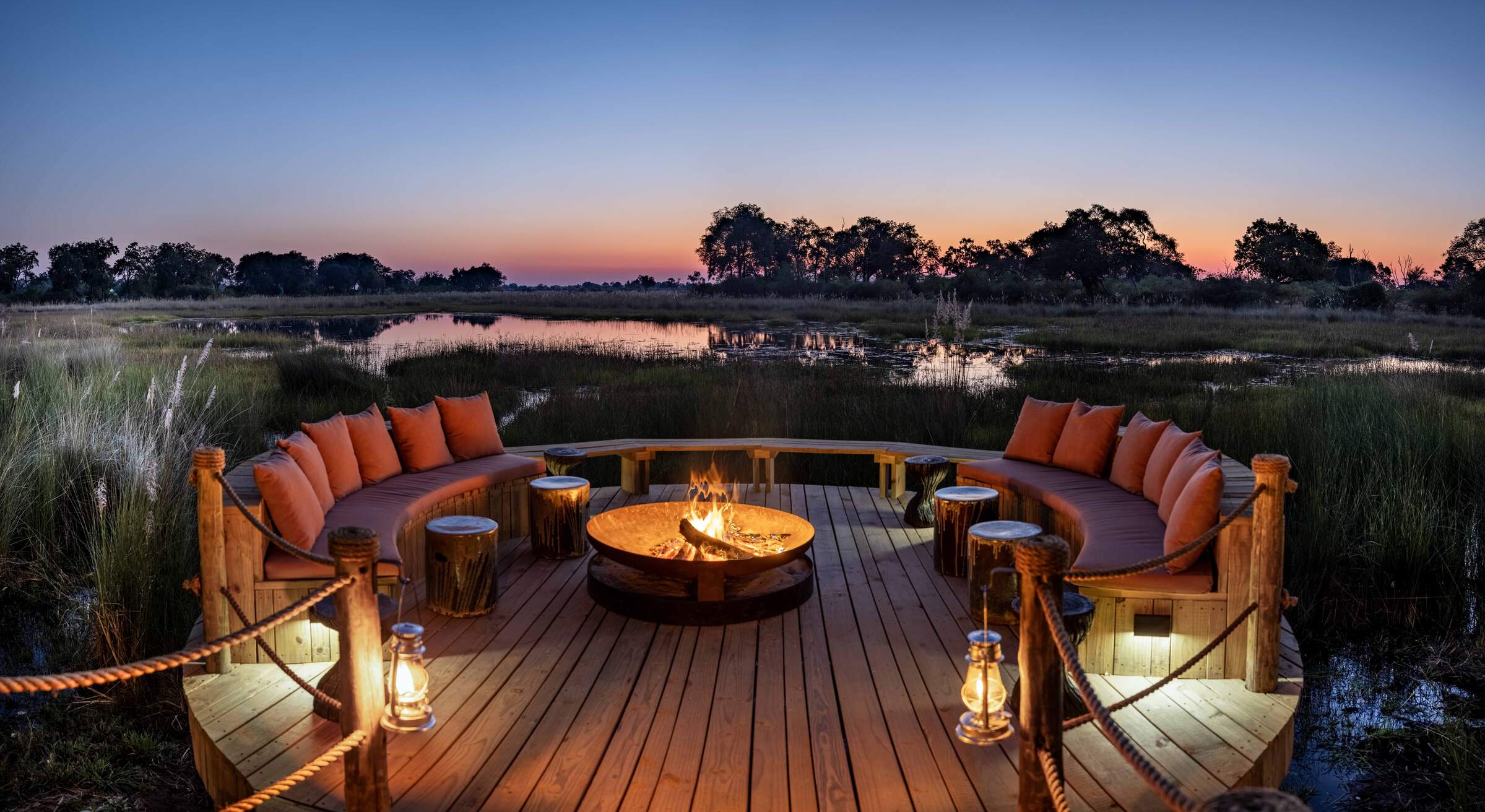
North Island Okavango
Deep in quintessentially “Okavango” territory, between deep-water and dry-land habitats, North Island focuses on a luxury safari experience with very good wildlife viewing opportunities.
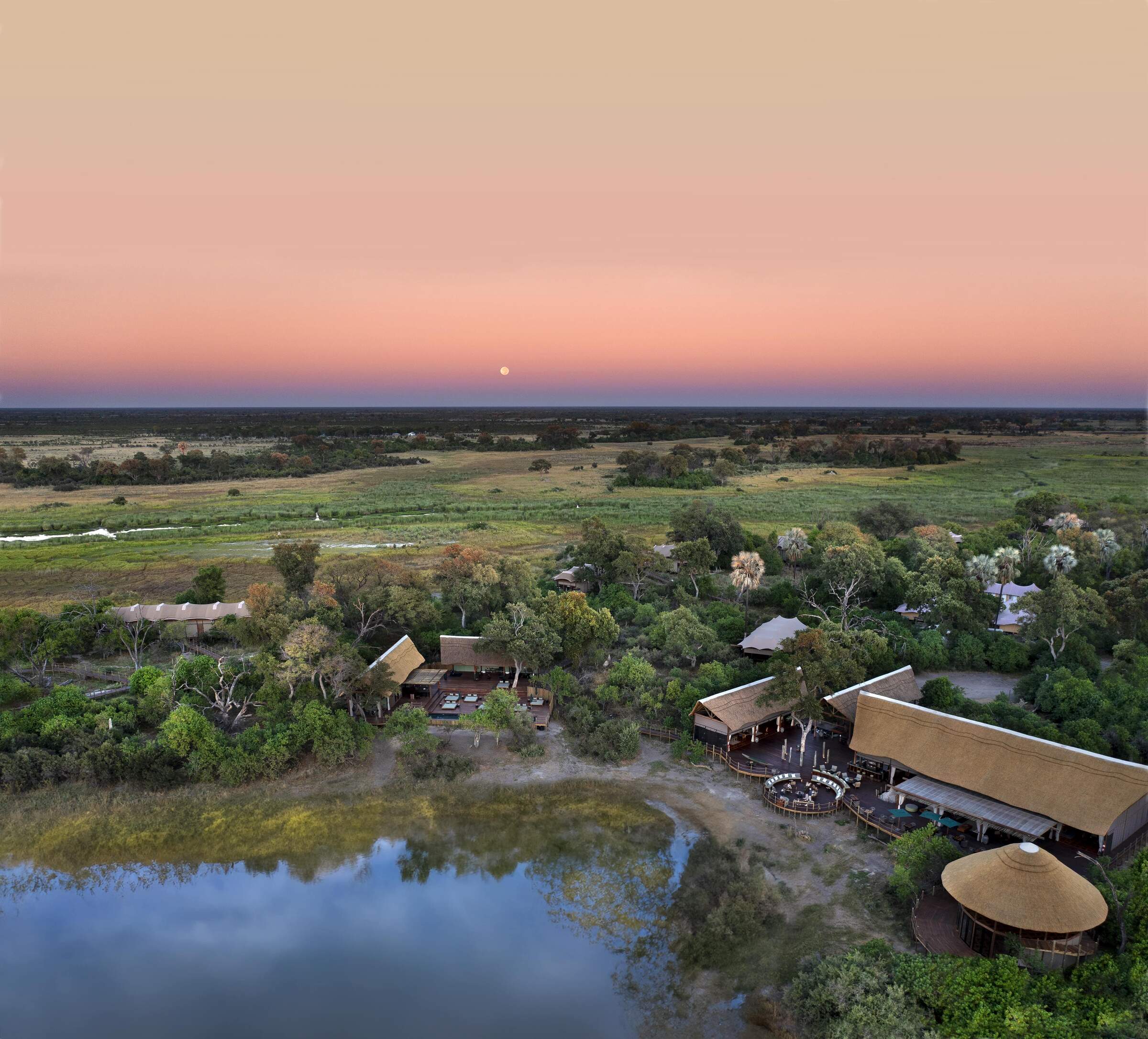
Atzaro Okavango
With a high level of tasteful luxury promised at Atzaro, we think it will be best suited to travellers seeking a touch of pampering alongside their safari.
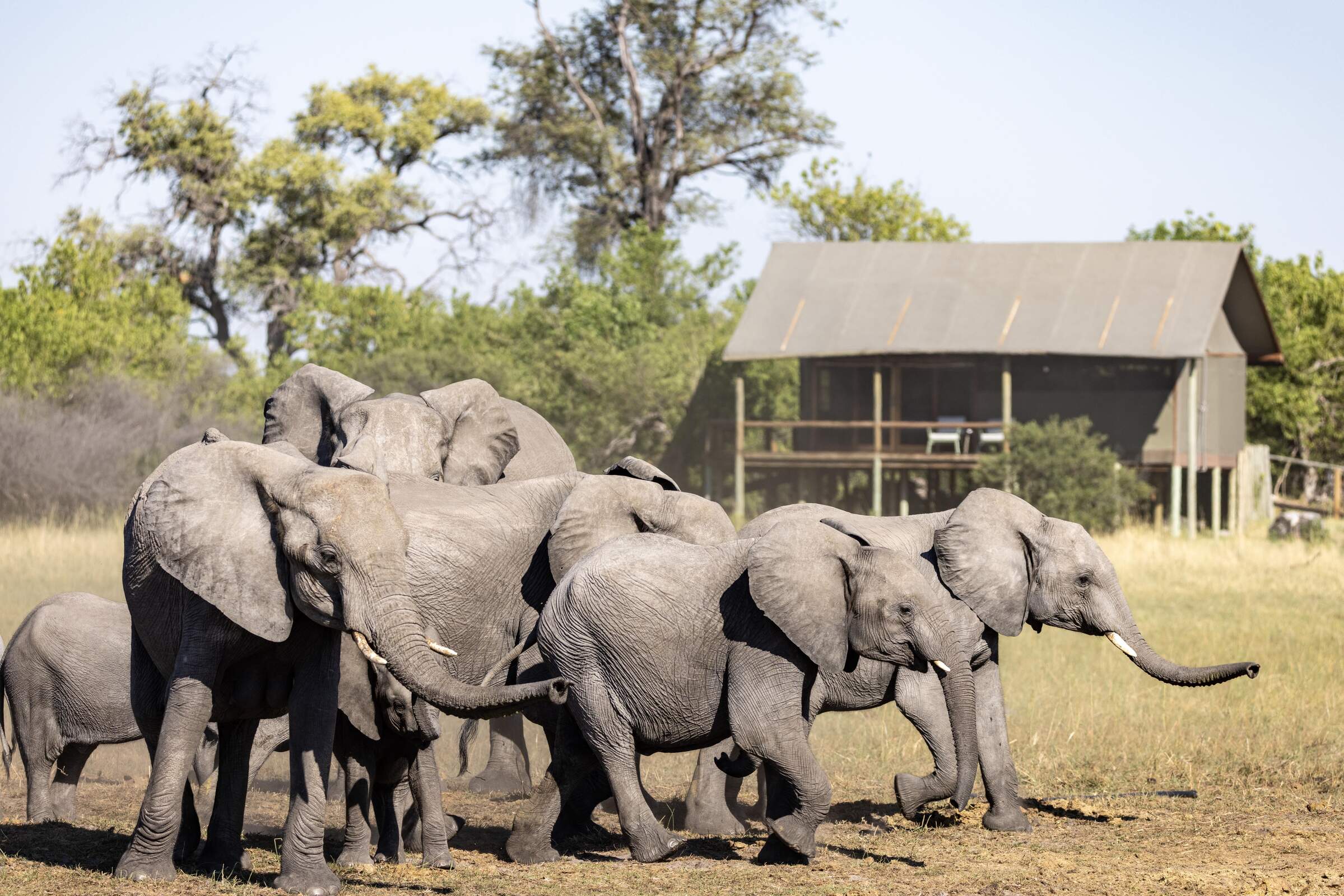
Mokolwane
Deep in the heart of the Okavango, the simple Mokolwane focuses on wildlife viewing in a large, untouched area.
When to go to Okavango Delta Safari Reserves
Our month by month guide: What it's like to visit Qorokwe Camp in Okavango Delta Safari Reserves
Jan
Feb
Mar
Apr
May
Jun
Jul
Aug
Sep
Oct
Nov
Dec
Okavango Delta Safari Reserves in January
January marks the peak of the rainy season in the Okavango Delta. Evening rains are often short but heavy, accompanied by occasional dramatic thunderstorms. Temperatures remain high, although cooler than the preceding months of October to December. Wildlife can be harder to spot as animals spread out across the lush floodplains.
This month is a birdwatcher’s paradise, with migratory species in abundance over flooded areas. Rising water levels in parts of the Delta make mokoro safaris possible, offering serene and immersive experiences. The vibrant greenery and dramatic skies provide stunning opportunities for photography. With relatively low rates and fewer visitors, January is ideal for those seeking a quieter, budget-conscious Botswana safari.
- Warm temperatures with frequent evening showers
- Birdlife at its most spectacular in the Delta
- Wildlife dispersed, but insects and smaller creatures abound
- Excellent availability in Delta lodges and camps
Our view
A good time to visit, with pros & cons
Weather in January
Okavango Delta Safari Reserves in February
February mirrors January’s weather patterns, with heavy rains and slightly cooler temperatures. The Delta’s landscape is at its greenest and teeming with life. Smaller animals, insects, and vibrant birdlife dominate, as many species raise their young. The rains create temporary pools and waterholes, further dispersing larger game, while thick vegetation and tall grass adds to the challenge of spotting big wildlife.
However, Moremi Game Reserve and select areas of the Delta still offer excellent game viewing opportunities. Rising water levels enhance water activities, with boat safaris providing unique access to the Delta’s watery beauty. February is particularly rewarding for photographers seeking lush landscapes and dramatic skies and birdwatchers, with many migratory species present.
- Warm with occasional thunderstorms
- Many animals with young in the Delta
- Big game dispersed throughout wetlands
- Big game dispersed, but viewing improves in drier areas
- Lower visitor numbers and great lodge availability
Our view
This is not a great time to visit
Weather in February
Okavango Delta Safari Reserves in March
March marks the gradual end of the main rainy season in the Okavango Delta. Sunny days become more frequent, with occasional afternoon thunderstorms. The Delta remains lush and vibrant, with wildlife activity increasing as animals finish raising their young and begin congregating around permanent water sources.
Rising water levels make boat safaris a highlight, offering intimate access to the Delta’s waterways. Birdwatching is excellent, with both resident and migratory species thriving. With fewer visitors, March offers a quieter, more personal safari experience.
- Rains taper off but temperatures remain warm
- Occasional small thunderstorms in Delta
- Wildlife begins congregating around water sources
- Ideal conditions for boat safaris
- Few tourists and attractive rates at camps
Our view
A good time to visit, with pros & cons
Weather in March
Okavango Delta Safari Reserves in April
April brings clearer skies to the Okavango Delta, with the landscape remaining green and lush. Night temperatures begin to drop, especially in the southern Delta. The annual floods from Angola start to flow through the northern Delta, filling channels and lagoons, creating ideal conditions for water-based activities like boat safaris.
Wildlife viewing improves as vegetation thins and predator activity increases with cooler evenings. Moremi Game Reserve and the private concessions offer rewarding game drives, and walking safaris on the larger islands, such as Chief’s Island, become popular during this time. Birdwatching remains excellent, with many migratory species still present. April’s combination of pleasant weather, wildlife activity, and relatively low rates makes it a rewarding time to visit.
- Cooler evenings and occasional light showers
- Floodwaters begin to fill Delta channels
- Predator-prey interactions increase
- Ideal for walking safaris and boat trips
- Popular shoulder season, rates fairly low
Our view
A good time to visit, with pros & cons
Weather in April
Okavango Delta Safari Reserves in May
May is a popular time to visit the Okavango Delta, marking the last month of the shoulder season. The annual floods continue to spread through the Delta, transforming the landscape. Cooler mornings and evenings encourage predator activity, while thinning vegetation makes wildlife spotting easier, though some tall grasses may still obstruct views.
May offers excellent photographic opportunities with clear, crisp air. It's a favourite time for many visitors, combining good wildlife sightings with pleasant weather. Camp bookings throughout the Delta fill up quickly during this period.
This is a perfect month for scenic flights, offering breathtaking views of the advancing floodwaters. Mokoro trips through the Delta’s tranquil waterways provide a unique perspective on the environment. Camps start to fill quickly as the Delta’s combination of pleasant weather and excellent wildlife sightings makes it a favourite among safari-goers.
- Cool mornings and evenings with little rain
- Improved game viewing as Delta grasses thin
- Predator activity increasing in drier areas
- Scenic flights and water activities highly recommended
- Last month of shoulder season for camps
Our view
A very good time to visit
Weather in May
Okavango Delta Safari Reserves in June
June signals the start of the dry season in the Okavango Delta. Days are warm, with clear skies, while mornings and evenings can be cold, occasionally reaching freezing temperatures. The annual floods reach their peak, creating spectacular conditions for water-based activities like boat safaris along the Khwai River and in private concessions.
Wildlife concentrates around permanent water sources as surface water dries up, improving game viewing. The thinning vegetation and crisp, clear air make June perfect for photography. High demand for camp bookings reflects its popularity, as this month combines great game viewing and pleasant weather.
- Warm days, cold mornings and nights
- Peak floodwaters make boat safaris unforgettable
- Wildlife congregates around permanent water sources
- Excellent conditions for photography
- High demand for camps and lodges
Our view
Fantastic: the very best time to visit
Weather in June
Okavango Delta Safari Reserves in July
July offers cool mornings and evenings with warm, sunny days, making it ideal for wildlife viewing. The floodwaters remain at their peak, providing excellent opportunities for boat safaris. Vegetation continues to thin, enhancing visibility on game drives in Moremi Game Reserve and the Okavango’s private reserves.
Large herds of elephants and buffalo are common sights as they gather near water sources. Predator sightings, including lions and leopards, increase as prey concentrates. Birdwatching is rewarding, and the crisp winter air creates stunning photographic conditions. July is one of the most popular months to visit, with many lodges fully booked well in advance.
- Comfortable days, cold mornings and nights
- Excellent game viewing and predator activity
- Moremi and Khwai areas become busy
- Private concessions offer exclusivity
- High season rates; advance bookings essential
Our view
Fantastic: the very best time to visit
Weather in July
Okavango Delta Safari Reserves in August
August remains a highly sought-after month for visiting the Okavango Delta. Nights are cool, while daytime temperatures rise gradually. Wildlife viewing is exceptional as animals concentrate near water sources, while the Delta’s floods are typically at their peak, offering picturesque settings for excellent boat safaris.
Walking safaris and game drives in areas like Moremi Game Reserve and Chief’s Island are particularly rewarding. Large herds of elephants and buffalo are common sights, and predator activity is high, with increased chances of seeing lions, leopards, and wild dogs hunting. The clear skies and lack of humidity create excellent stargazing conditions. With many travellers visiting during European and North American holidays, lodge availability can be challenging.
- Dry, warm days and cool nights in the Delta
- Fantastic wildlife viewing near water sources
- Excellent opportunities for game drives and boat safaris
- Cloudless skies, spectacular stargazing
- High demand for accommodation – book early
Our view
Fantastic: the very best time to visit
Weather in August
Okavango Delta Safari Reserves in September
September is a favourite for many safari-goers in the Okavango Delta. Daytime temperatures rise, but nights remain cool. The landscape transforms as greenery fades, and hazy conditions create dramatic sunsets. Wildlife viewing peaks as animals cluster around permanent water sources, with especially large numbers of elephants and buffalo. This concentration of prey attracts predators, increasing chances of witnessing exciting hunts.
The return of migratory birds enhances birdwatching. Water levels begin to recede, but boat cruises are still possible. Dusty conditions may challenge photographers, but the stunning landscapes and wildlife action more than make up for it.
- Warm days, cool nights in the Delta
- Prime month for Okavango wildlife viewing
- Migratory birds return, enriching birdwatching
- Spectacular sunsets and dramatic scenery
- High season rates, many Delta camps full
Our view
Fantastic: the very best time to visit
Weather in September
Okavango Delta Safari Reserves in October
October is the hottest and driest month in the Okavango Delta. Wildlife concentrates around the last remaining water sources, creating some of the most dramatic game viewing opportunities of the year. Predator-prey interactions are frequent and visibility is excellent, making for thrilling safaris.
Walking safaris are particularly rewarding, especially on smaller islands, but early starts are essential to avoid the midday heat. Towards the end of the month, the first rains may bring relief and begin rejuvenating the parched landscape. Despite the heat, October offers excellent big-game viewing and dramatic photographic moments of animal interactions.
- Hot days, with late-month chances of rain
- Outstanding big-game viewing near water sources
- Water activities limited as floods recede
- Walking safaris provide unique experiences
- Final month of the peak safari season
Our view
Fantastic: the very best time to visit
Weather in October
Okavango Delta Safari Reserves in November
November marks the start of the green season in the Delta. Rising humidity and temperatures often lead to the first heavy rains; these are typically short, heavy showers in the late afternoon or night, creating spectacular scenes and bringing a flush of green to the parched landscape. Wildlife begins to disperse as waterholes refill, but game drives still offer rewarding sightings.
Water levels may be low, limiting boat activities, but November is exceptional for birdwatching, with the arrival of many migratory species. Scenic flights highlight the contrast between dry and wet areas. The first two weeks are popular for travellers seeking good game viewing at lower rates as the Delta transitions into its shoulder season.
- Hot, humid days in the Delta
- Dramatic rain showers , increasing as month progresses
- Migratory birds arrive in abundance
- Wildlife watching good, but less predictable
- Shoulder season offers mid-range rates
Our view
A good time to visit, with pros & cons
Weather in November
Okavango Delta Safari Reserves in December
December sees the rainy season in full swing across the Okavango Delta, bringing some respite from high temperatures. Game viewing becomes more challenging as wildlife disperses, but great sightings can still be had. The landscape transforms dramatically, with lush vegetation sprouting across the Delta. This period is excellent for birdwatching, with numerous migratory species present.
Water levels begin to rise, gradually improving conditions for boat safaris. The green season offers unique photographic opportunities, with dramatic skies and newborn animals. December is ideal for visitors seeking a more intimate Delta experience, with fewer tourists and lower rates at many camps and lodges. The combination of wildlife, birdlife, and scenic beauty makes it a rewarding time to visit.
- Warm temperatures
- High chance of rain in short, heavy storms
- Wildlife more dispersed across Delta
- Game viewing more challenging in wetlands
- Low-season rates and fewer visitors in most Delta camps
Our view
A good time to visit, with pros & cons
Weather in December

Looking for inspiration on where to travel next?
Visit our trip chooser to explore your options and find inspiration for your perfect African adventure
Inspire me